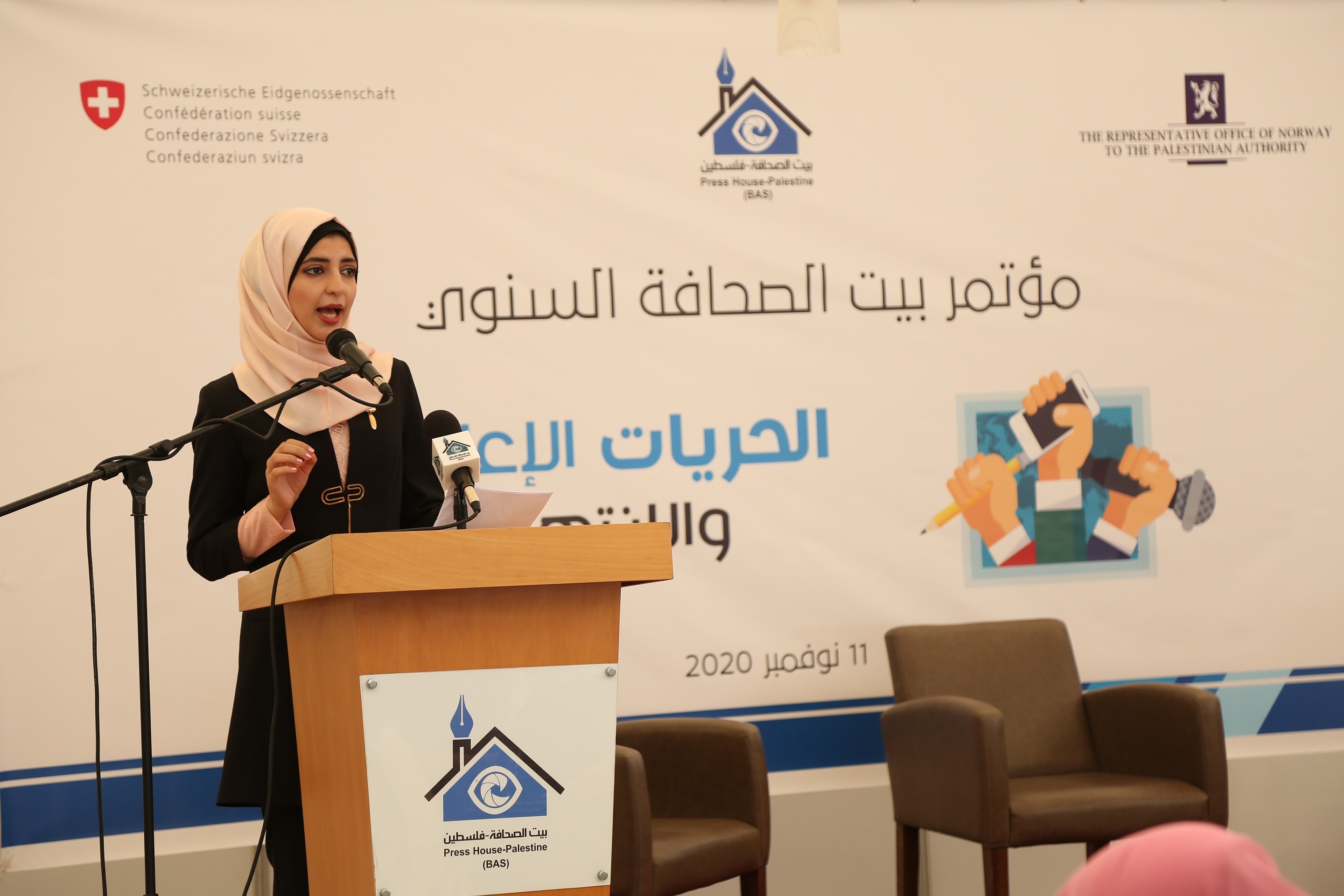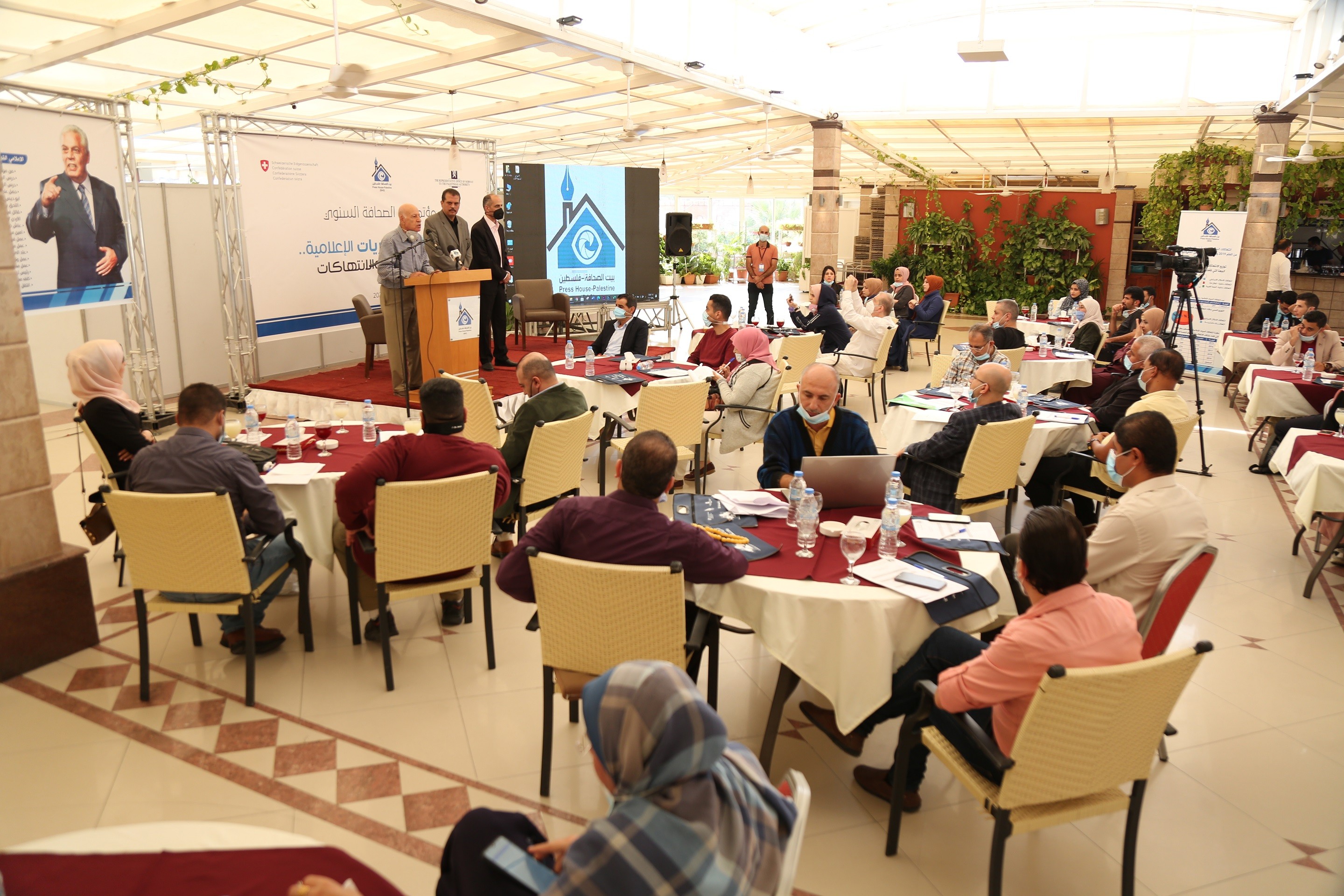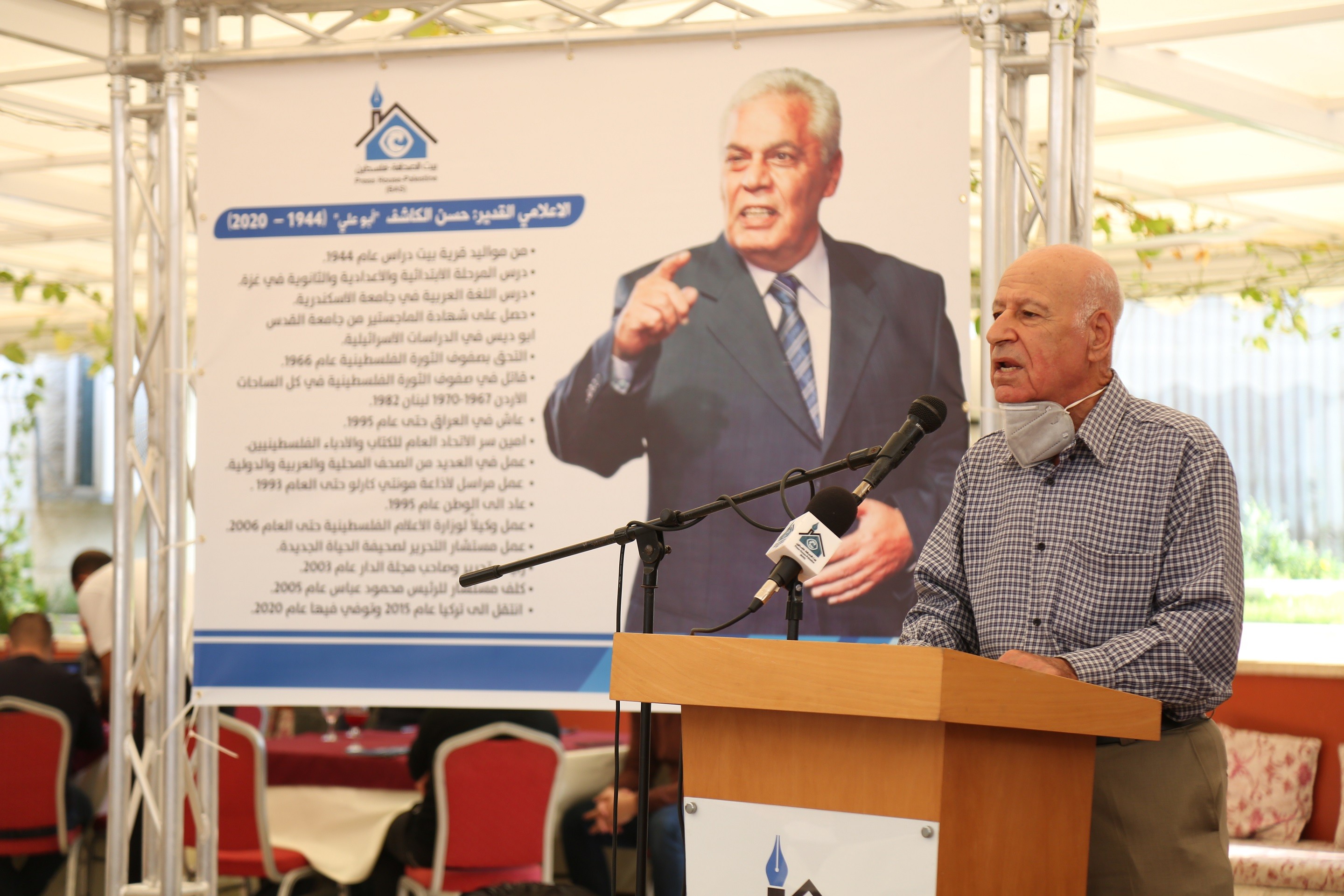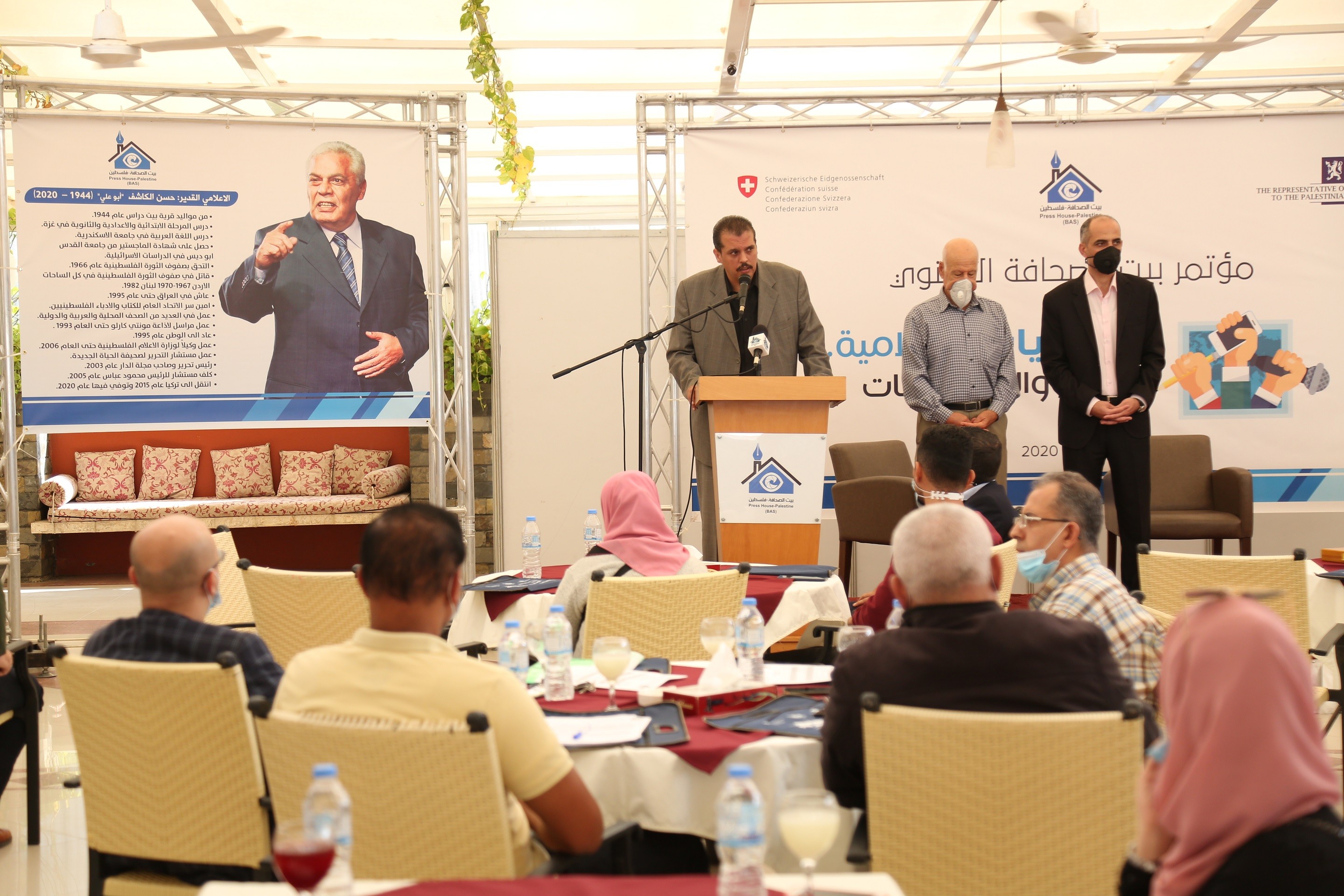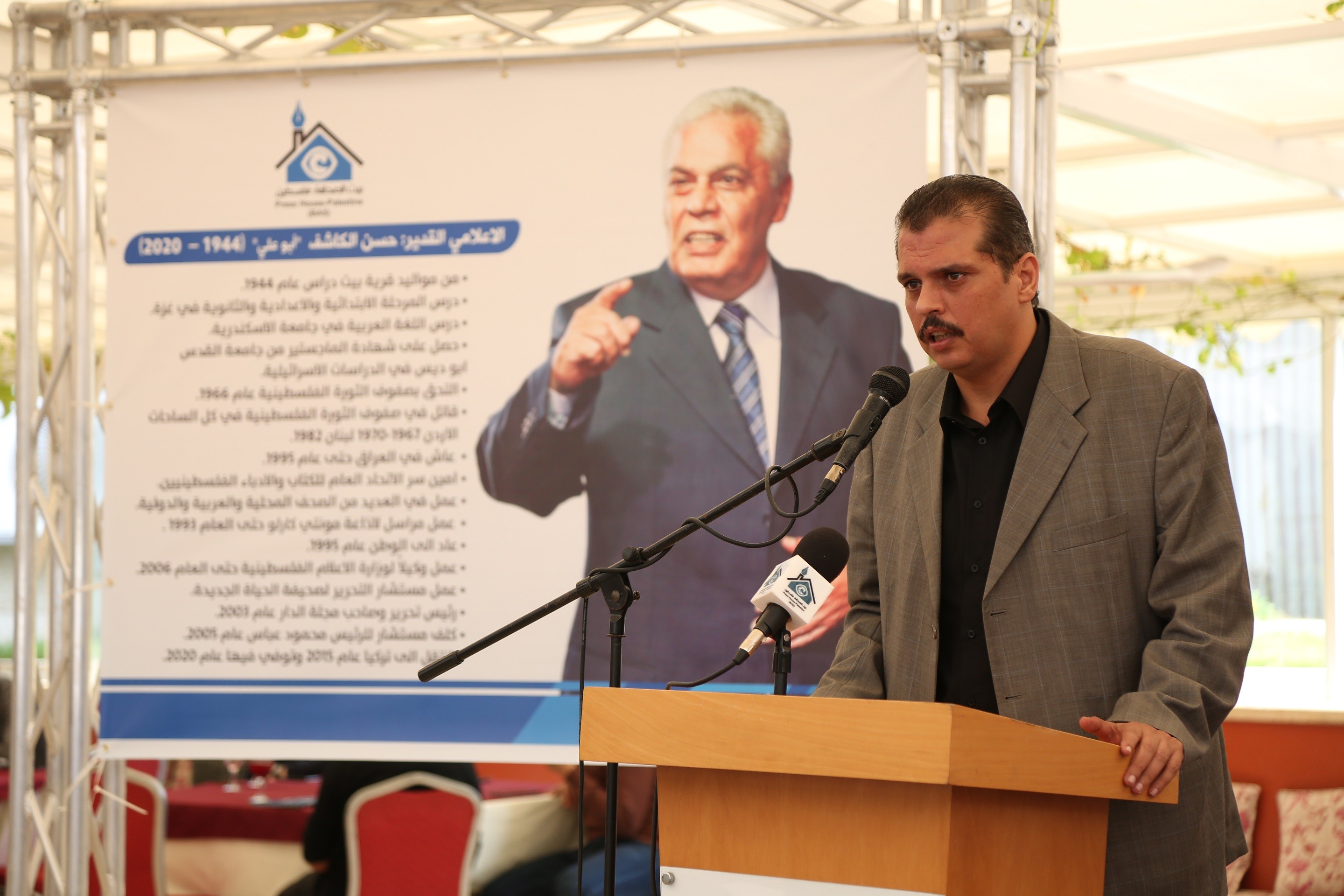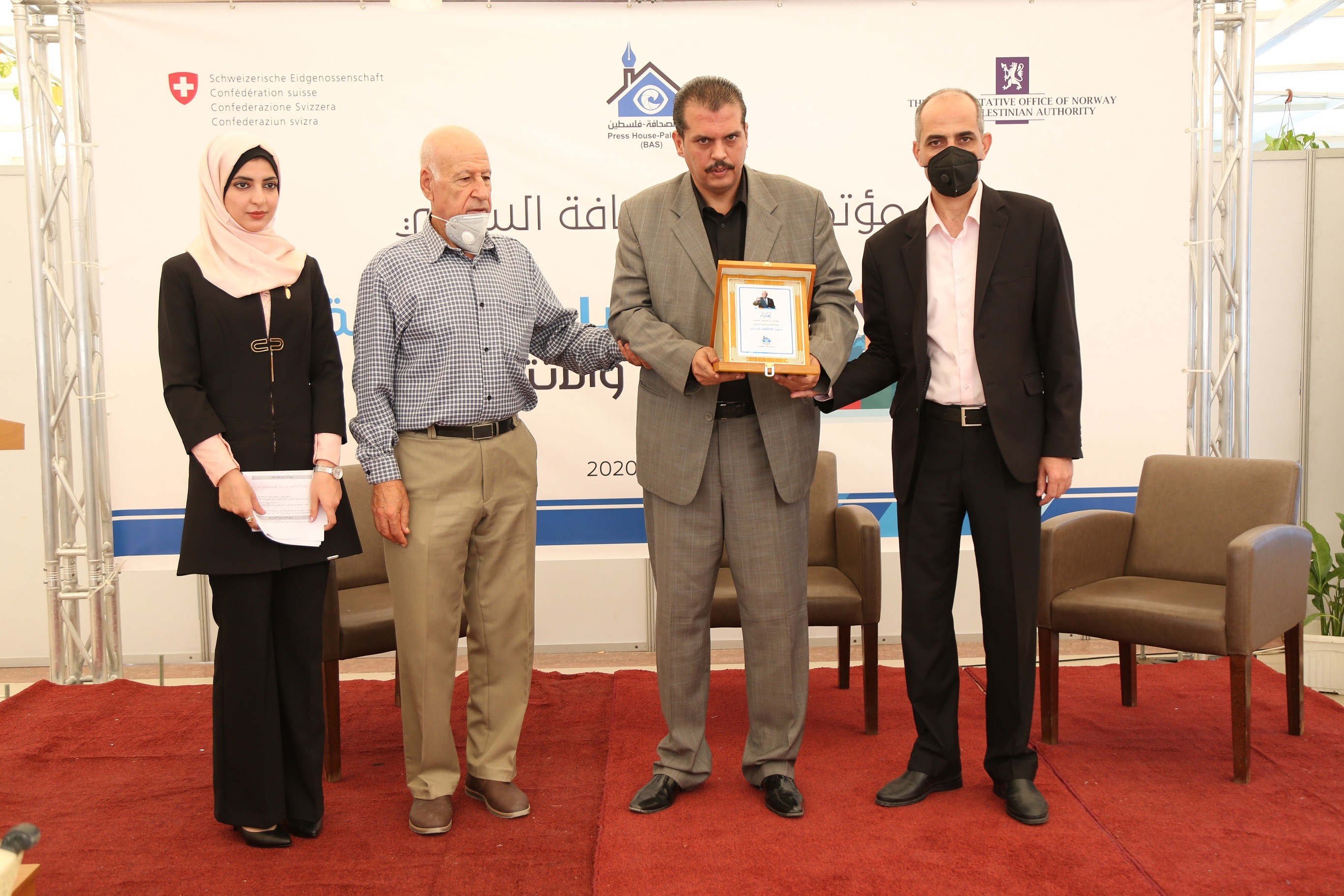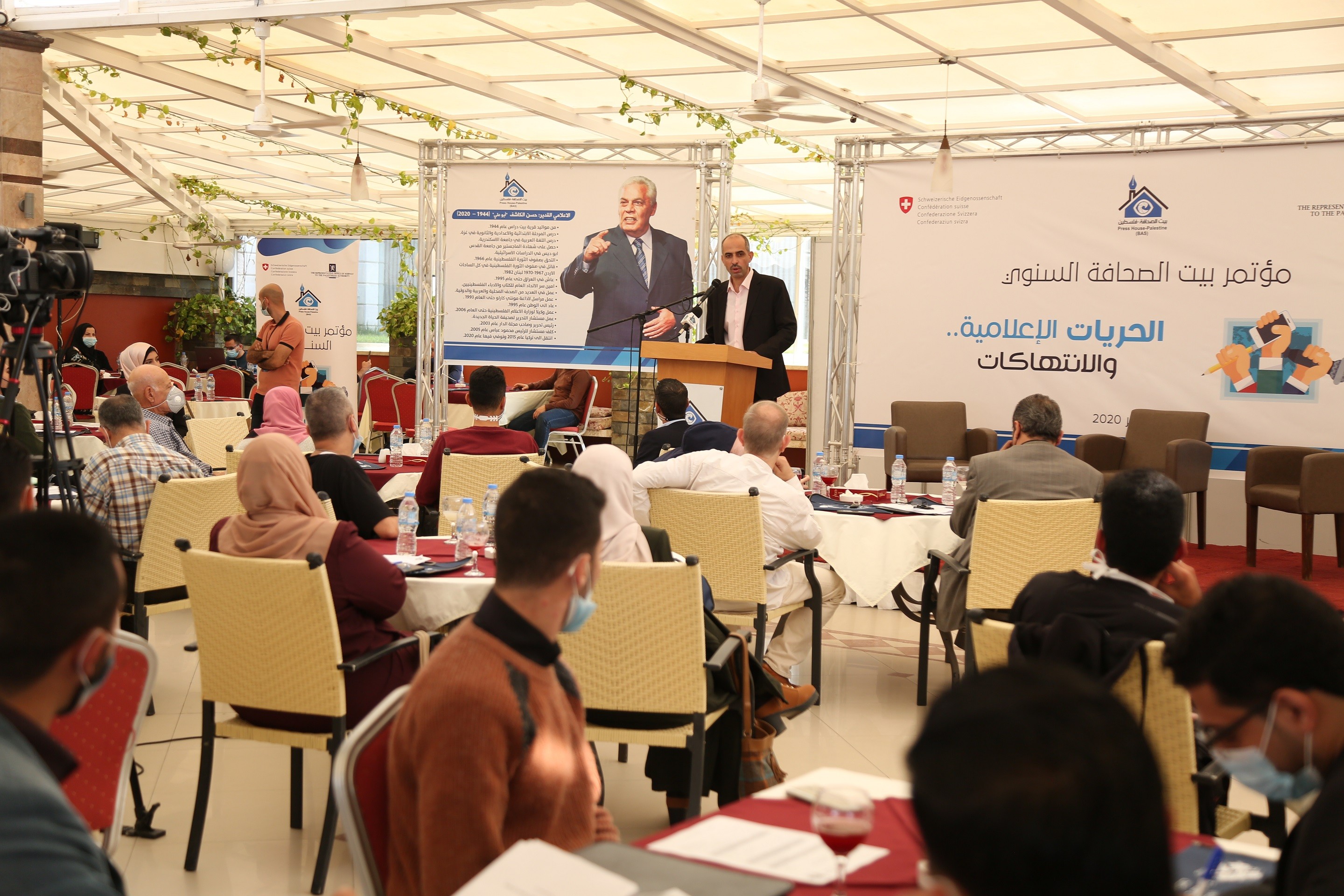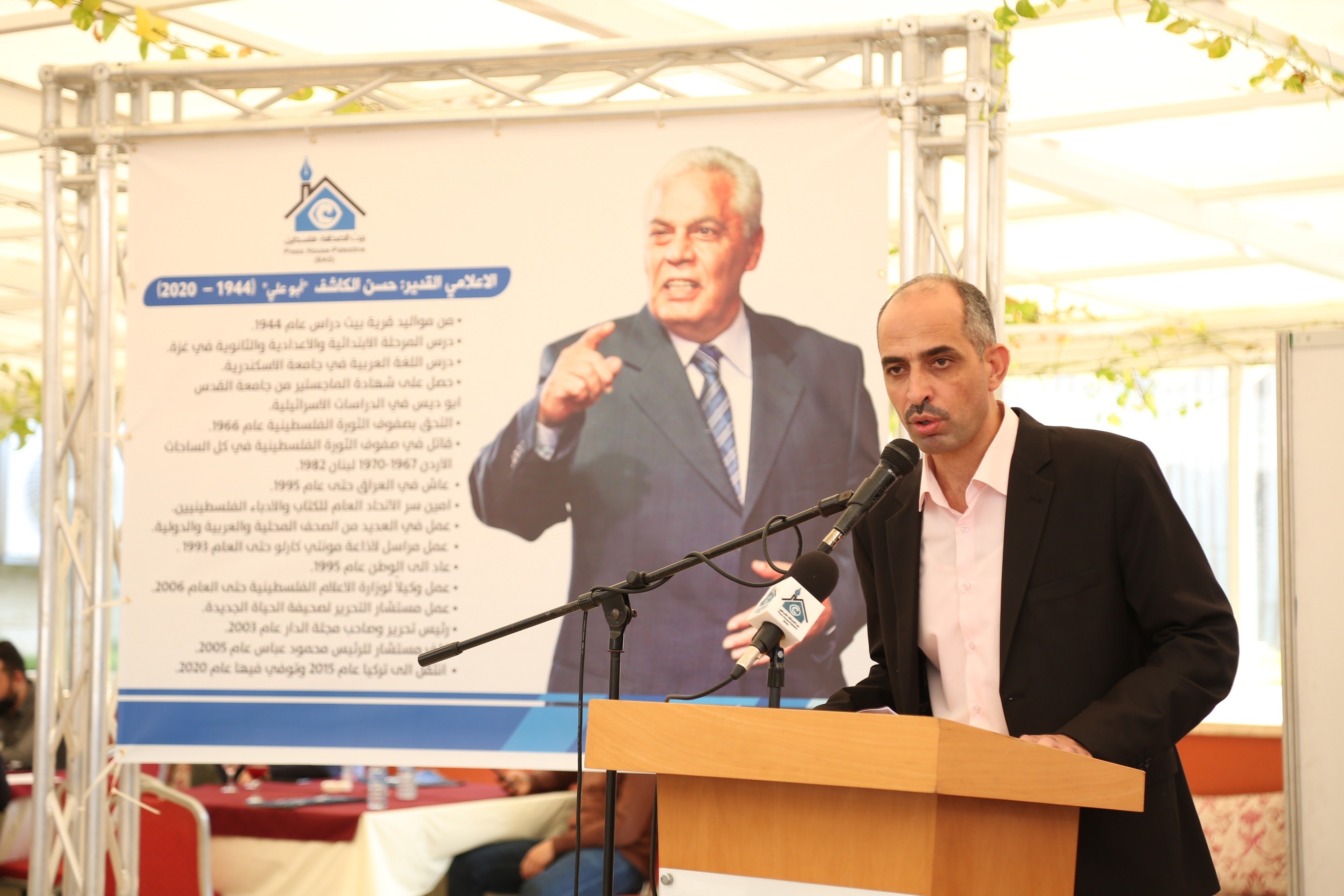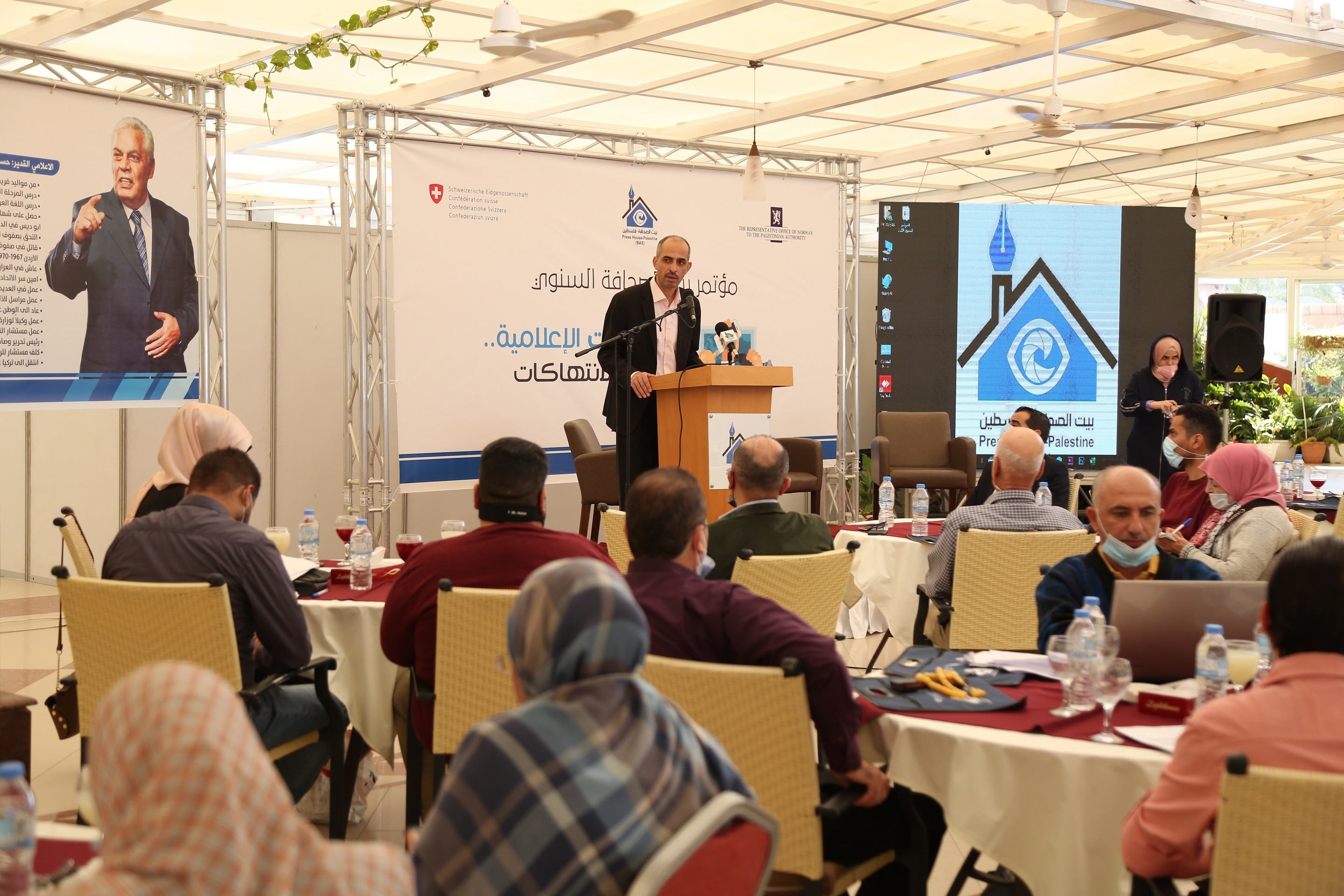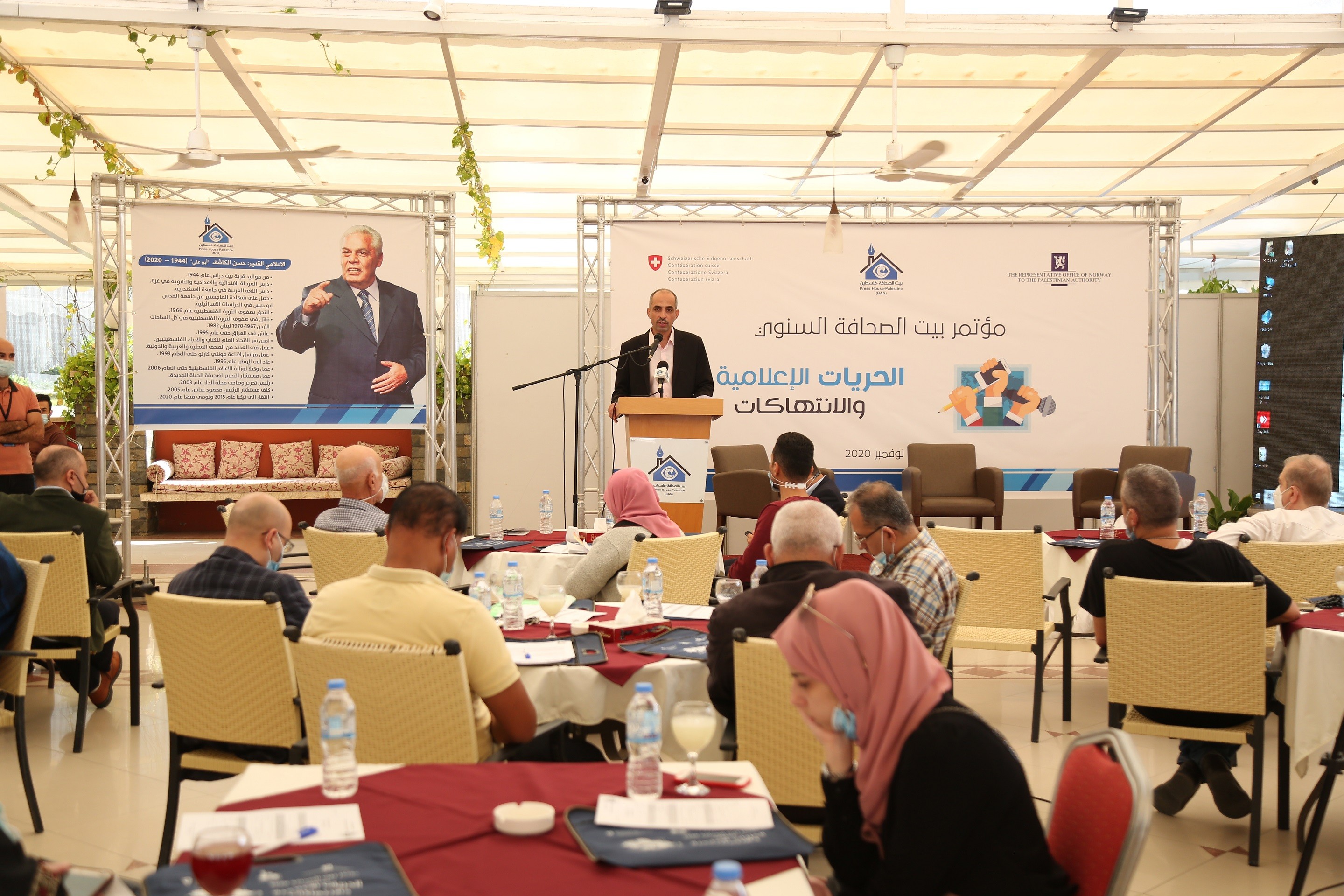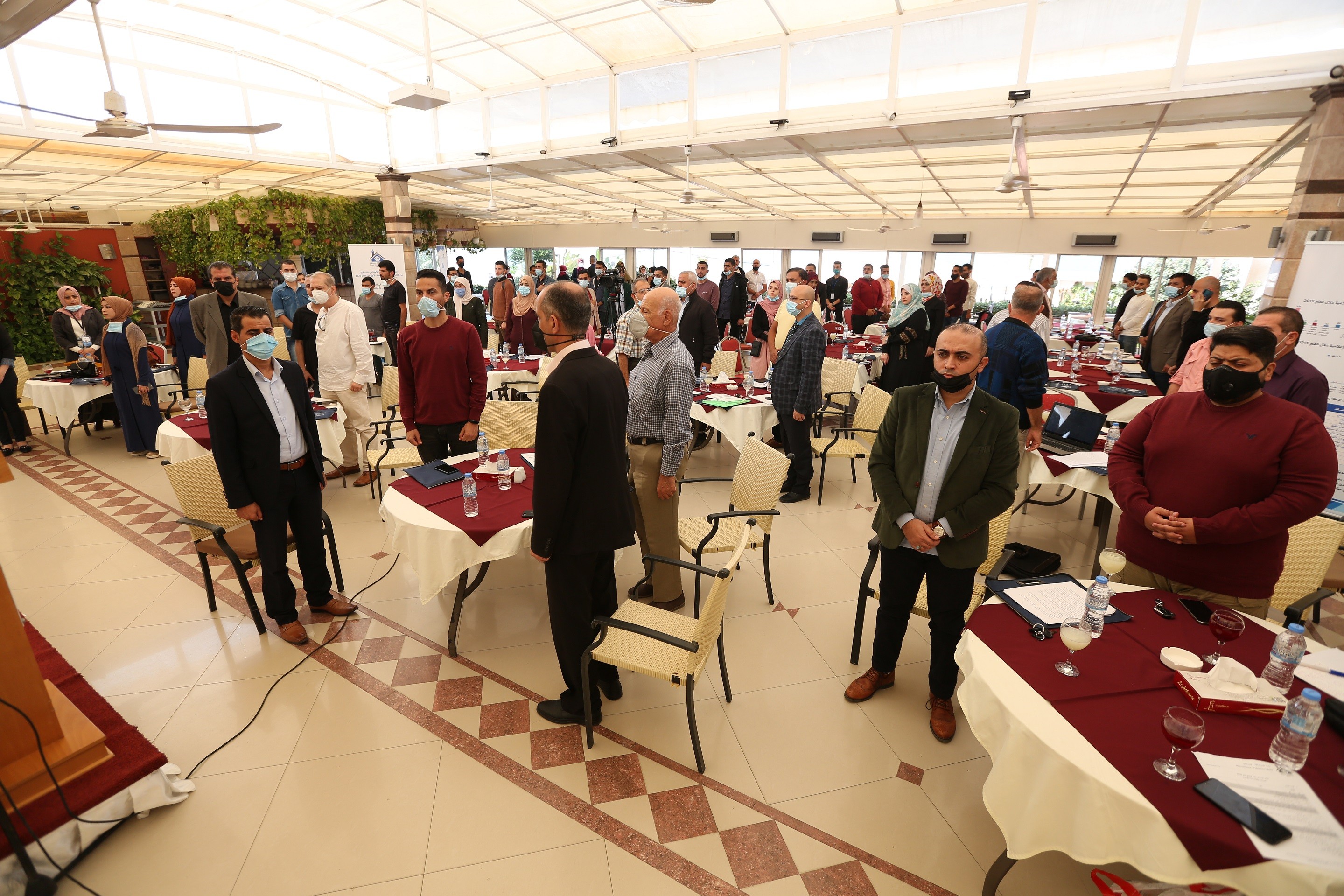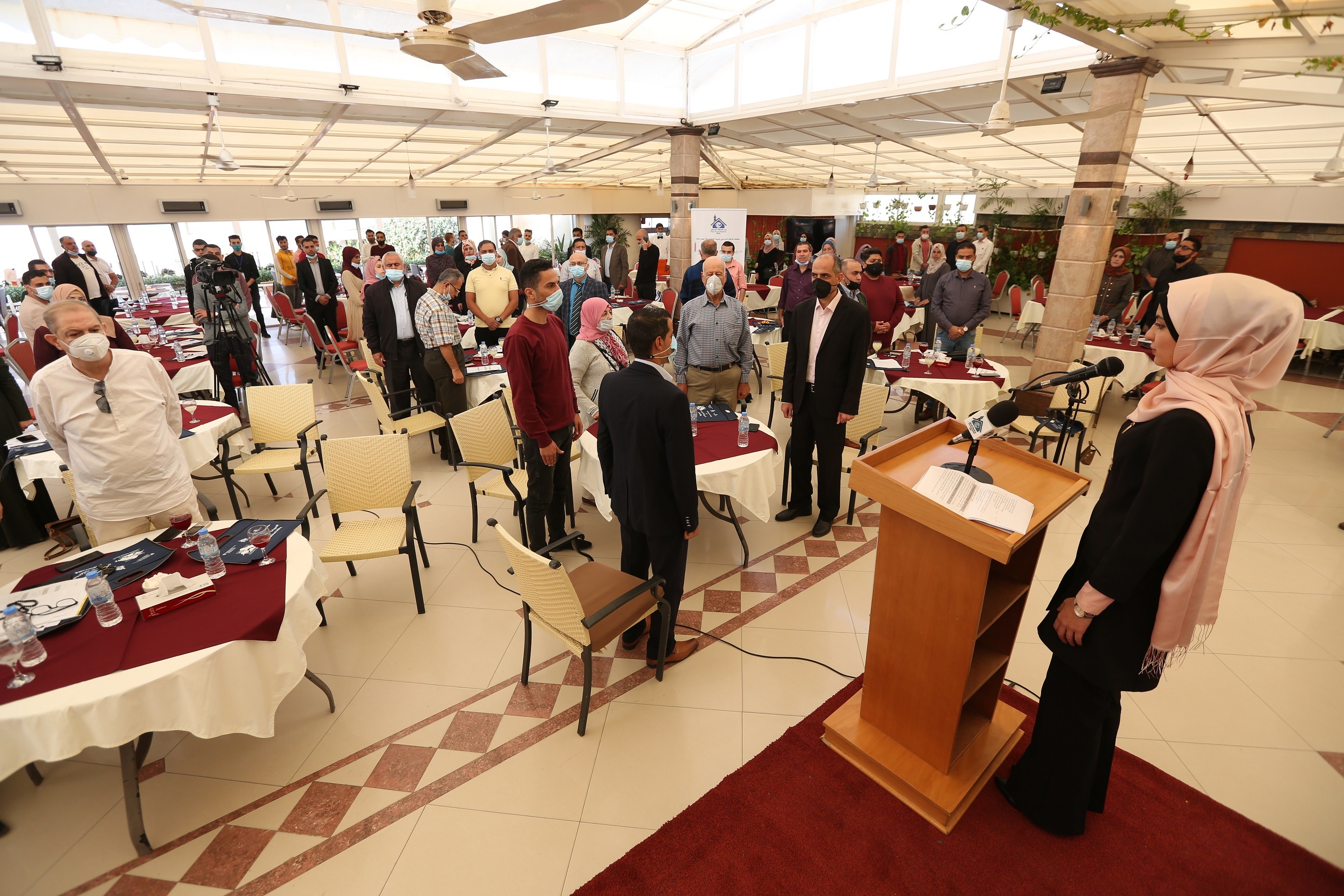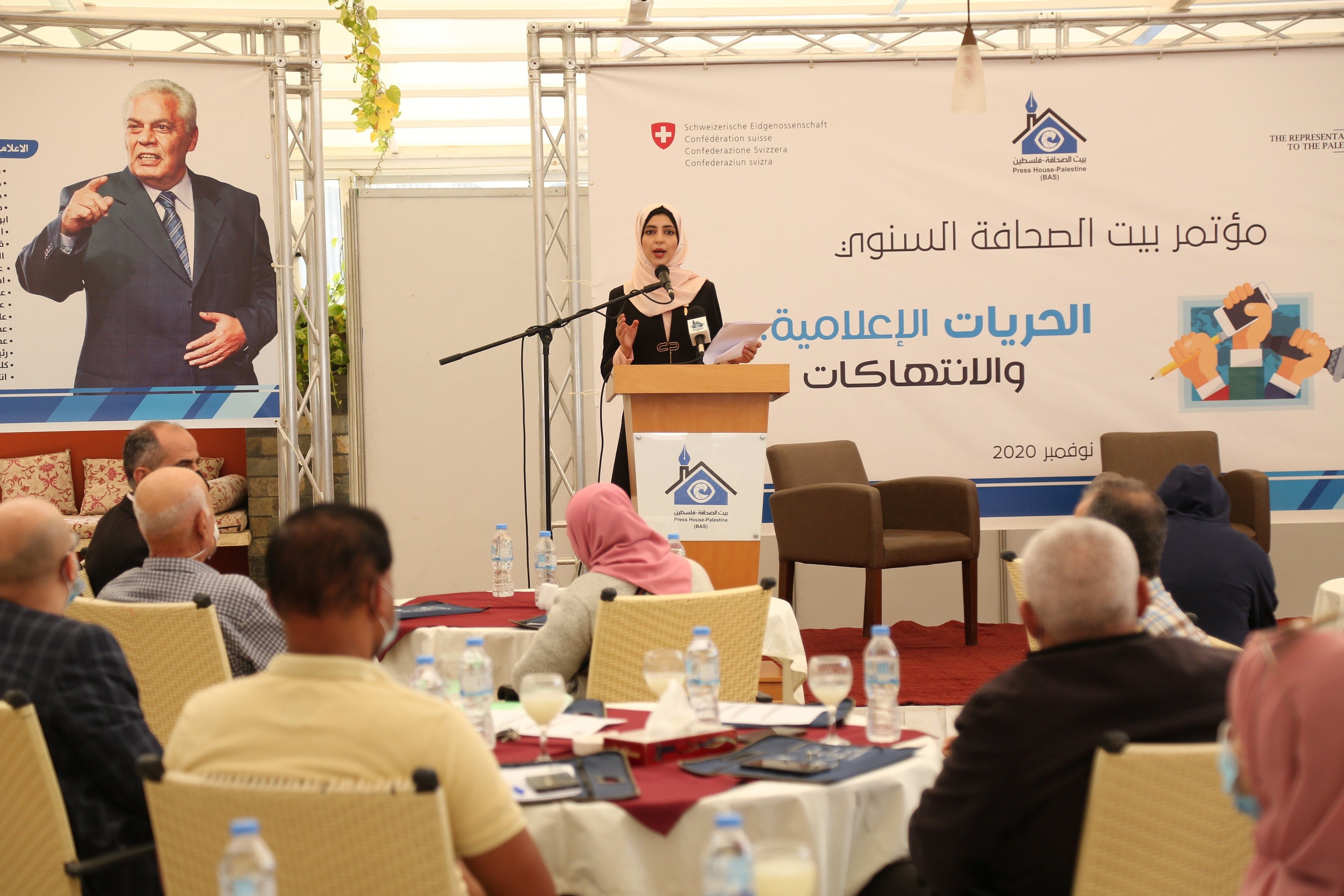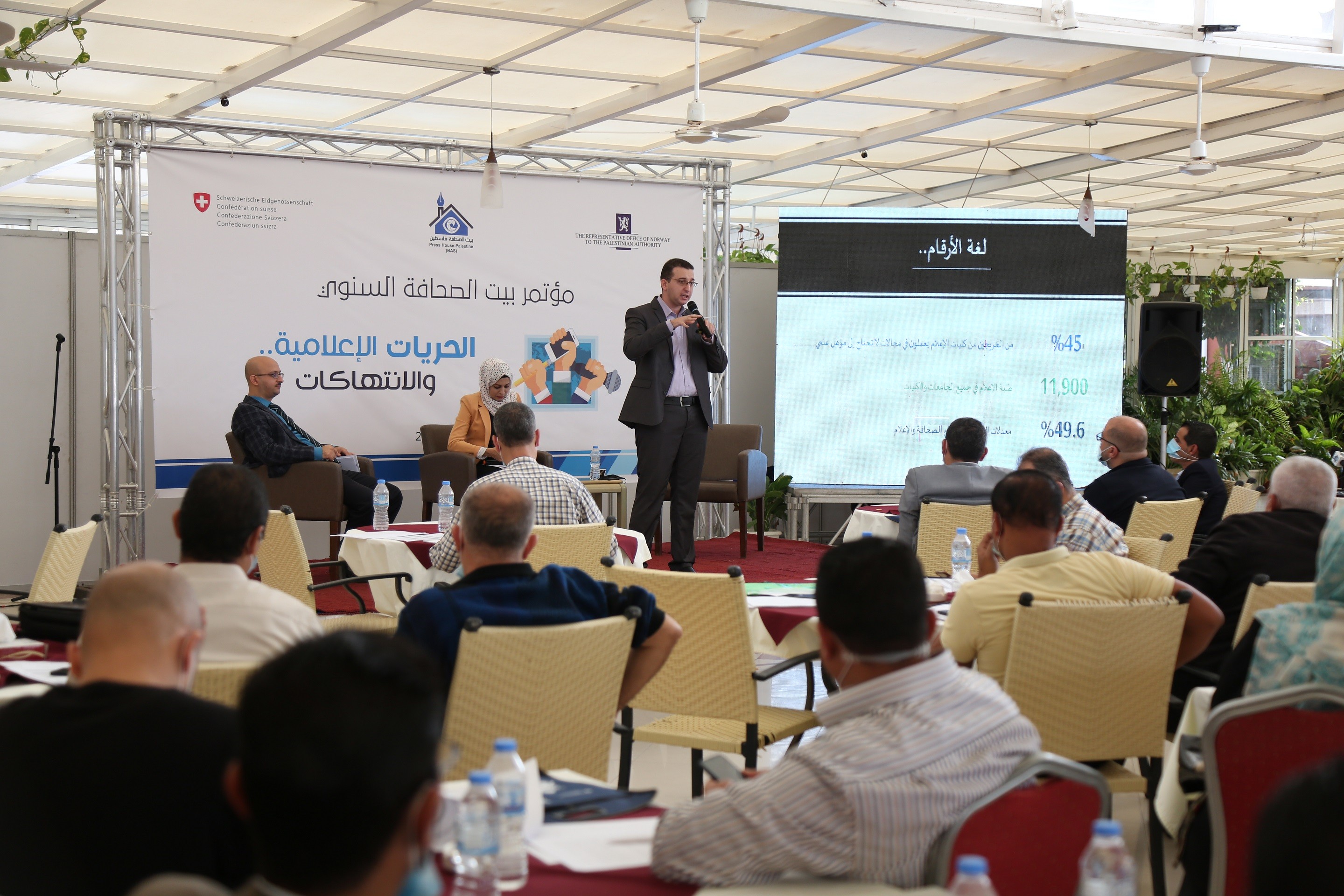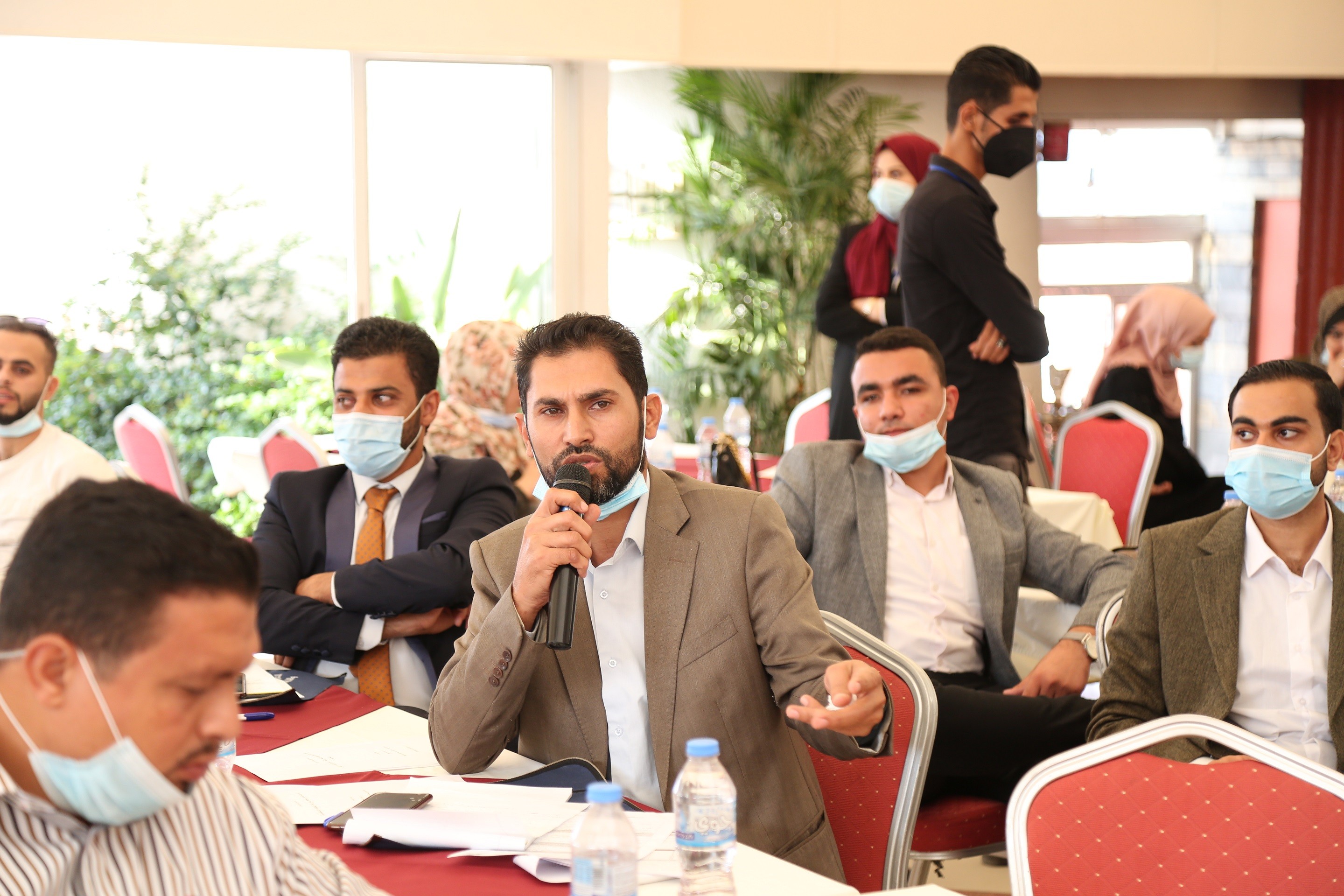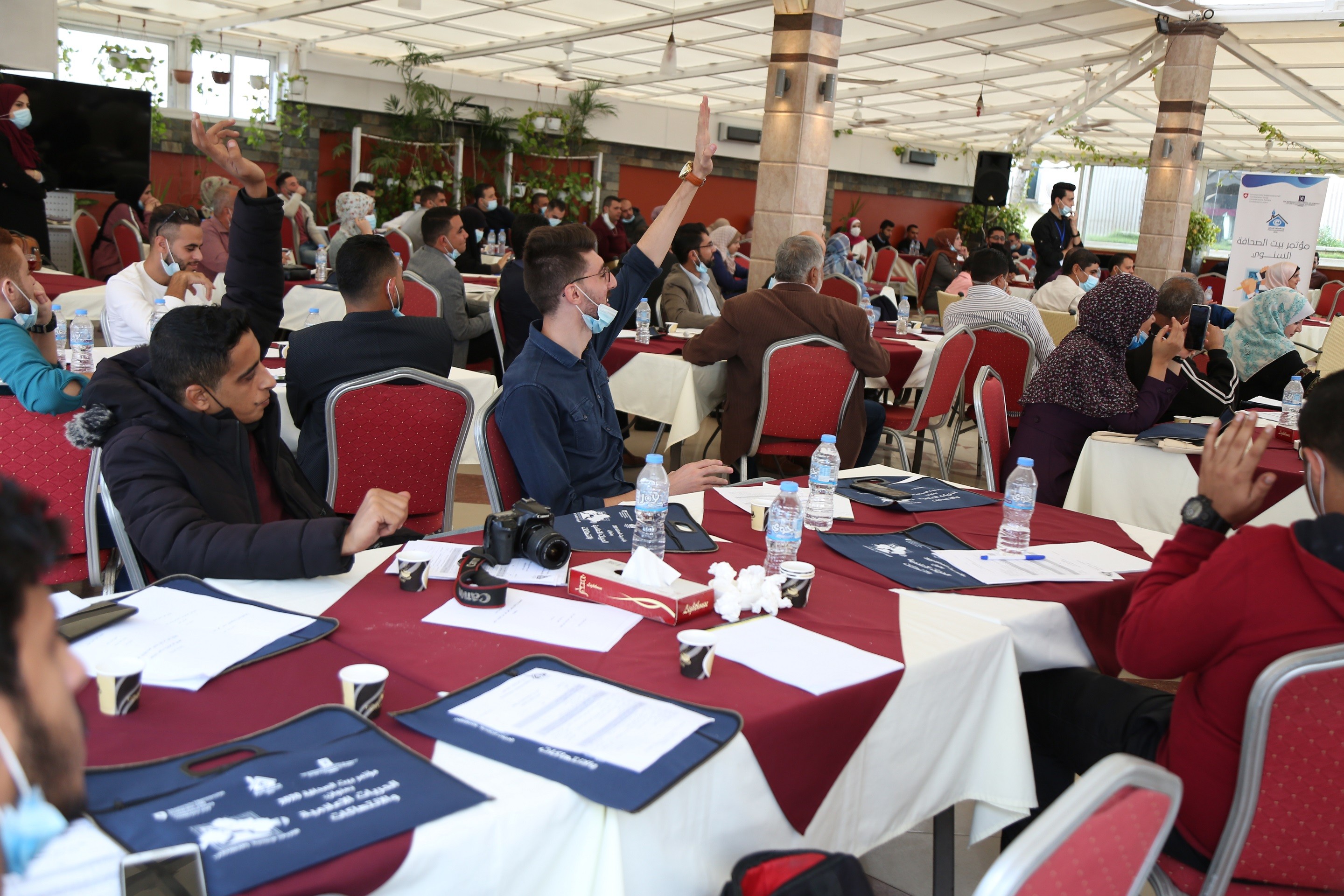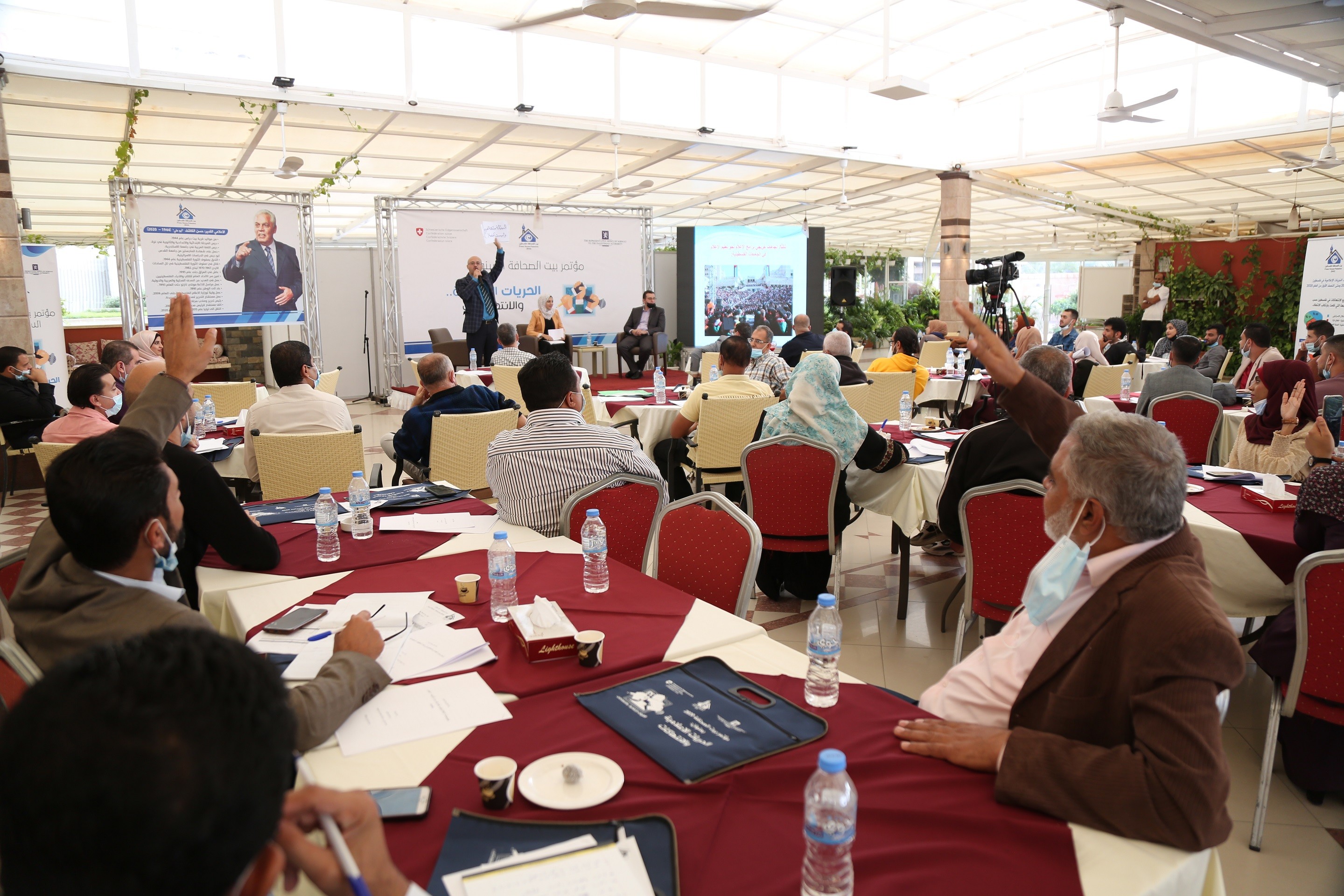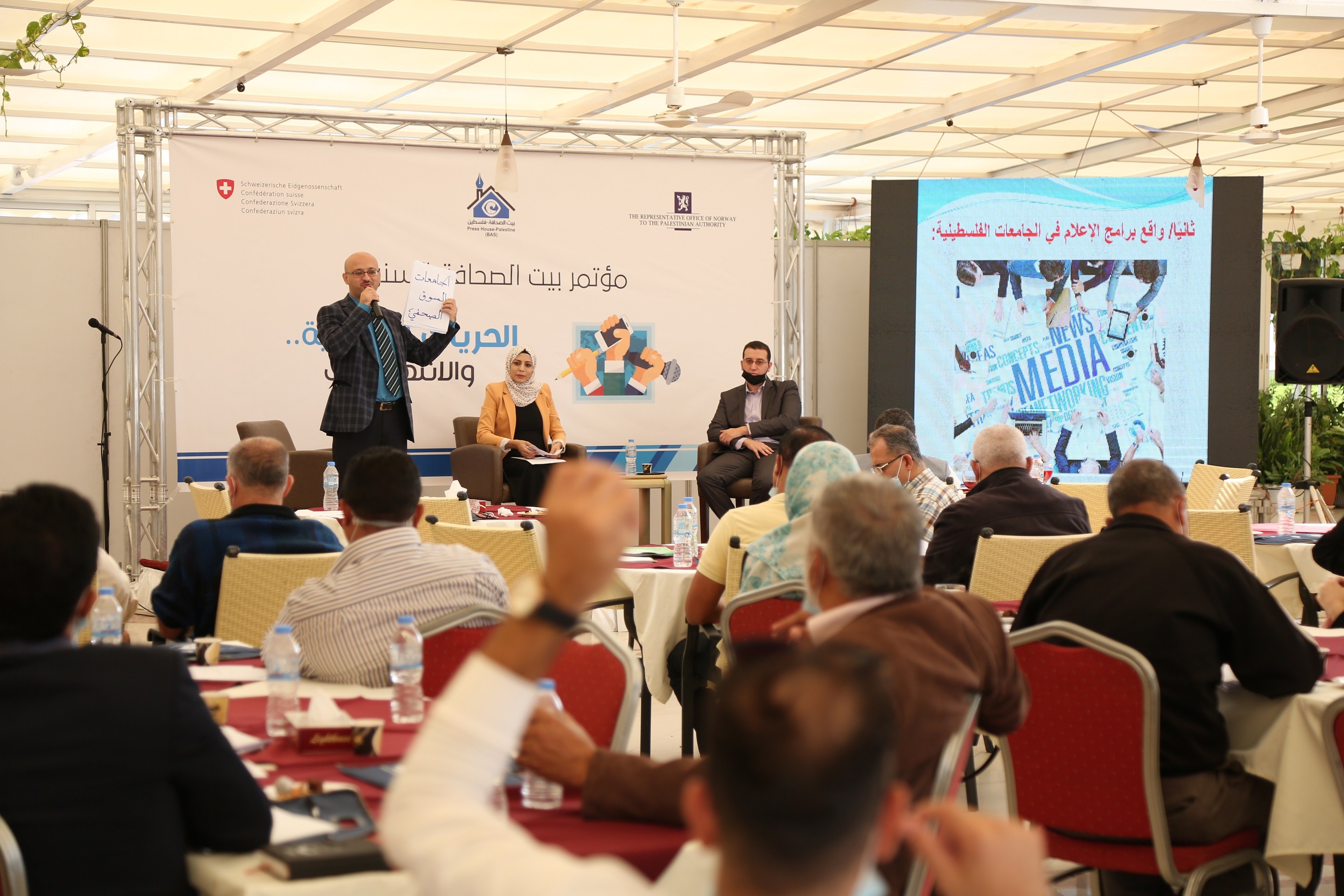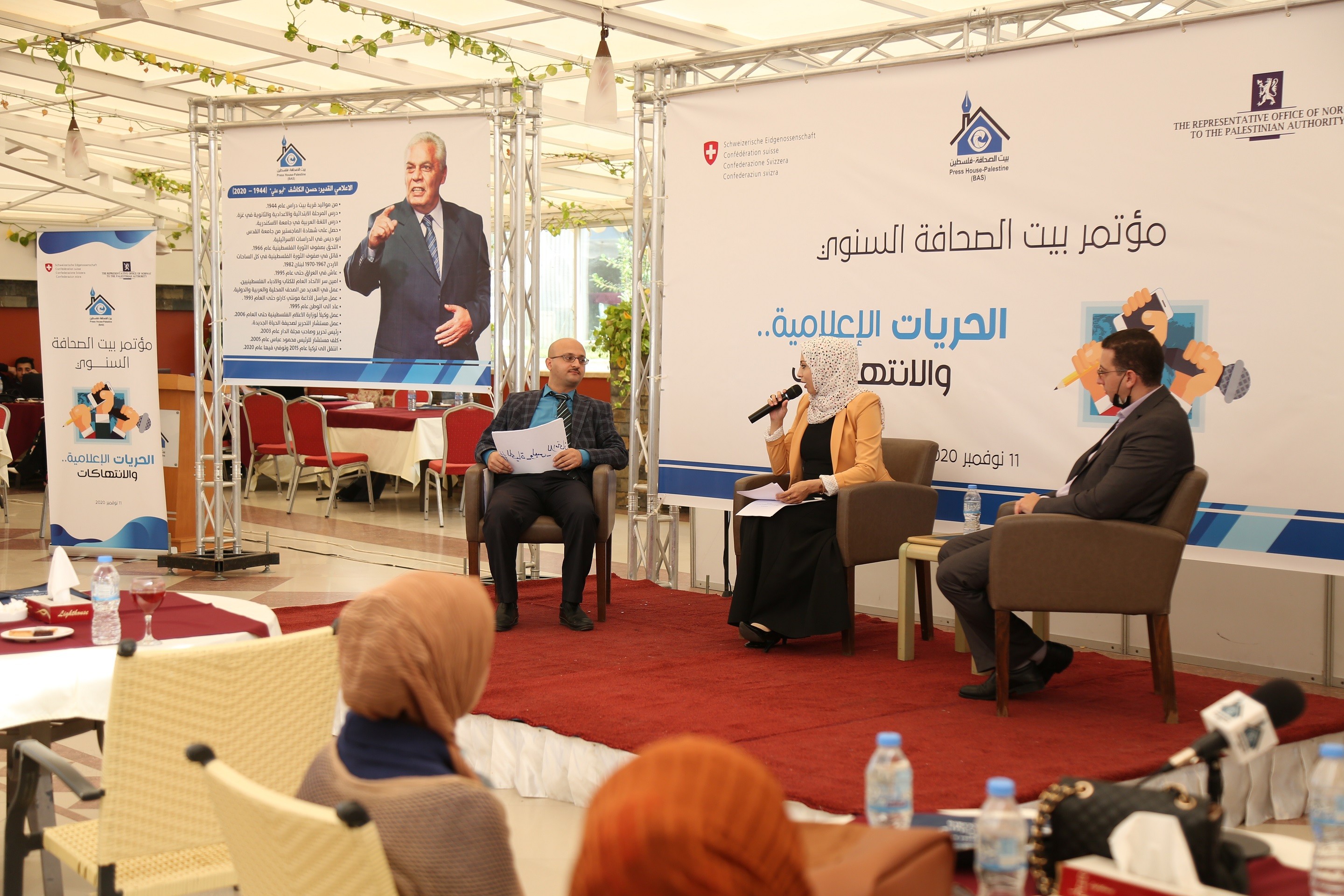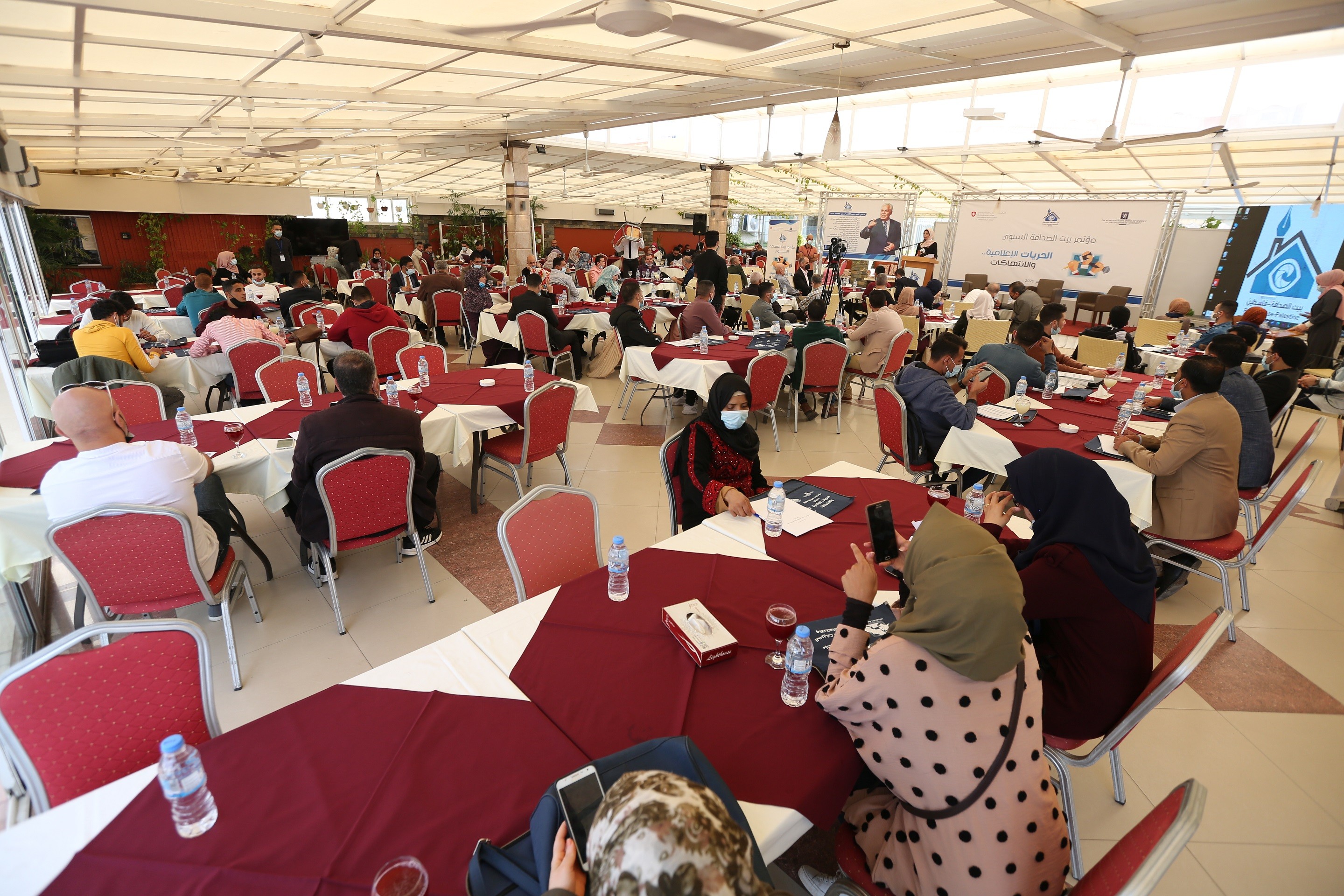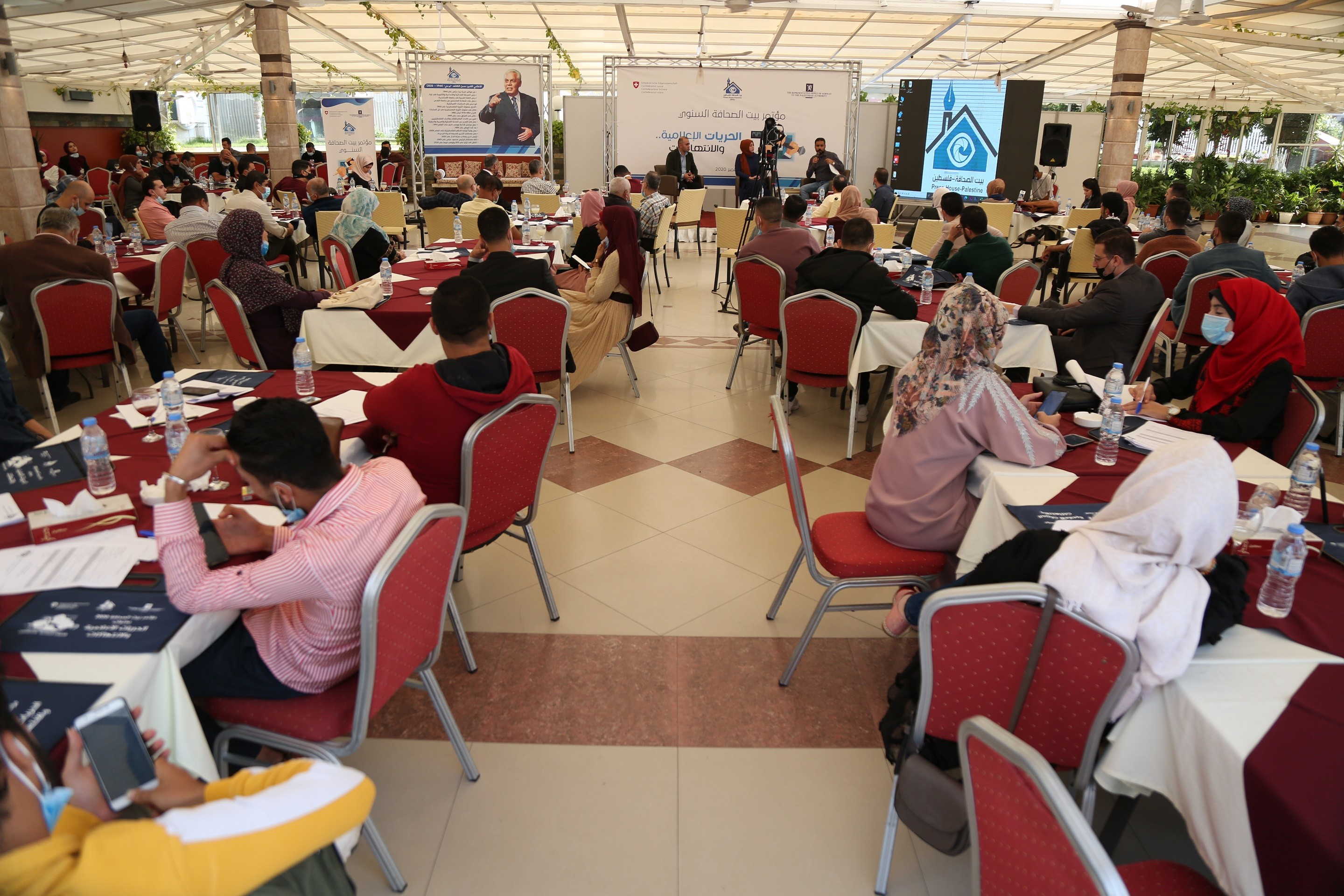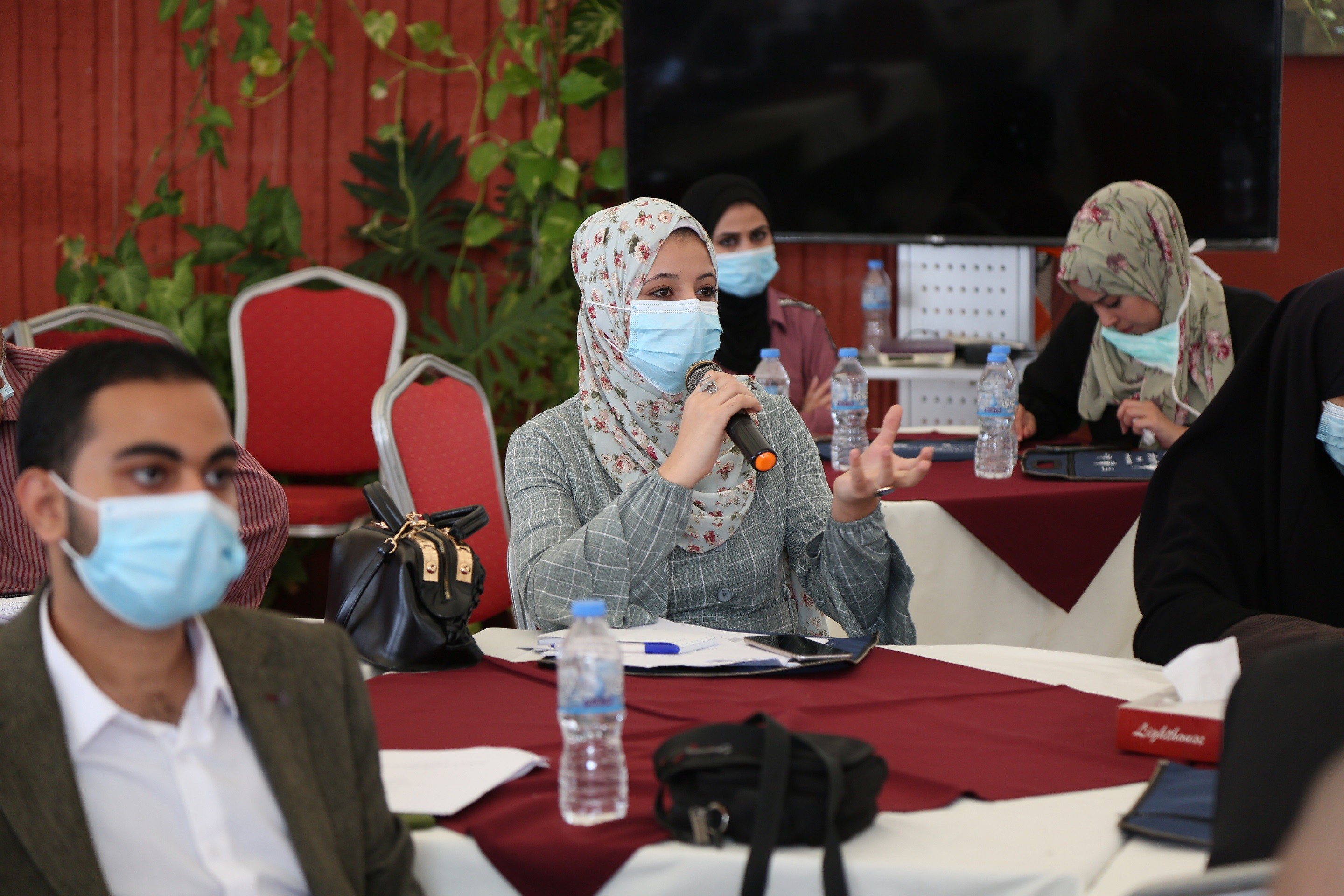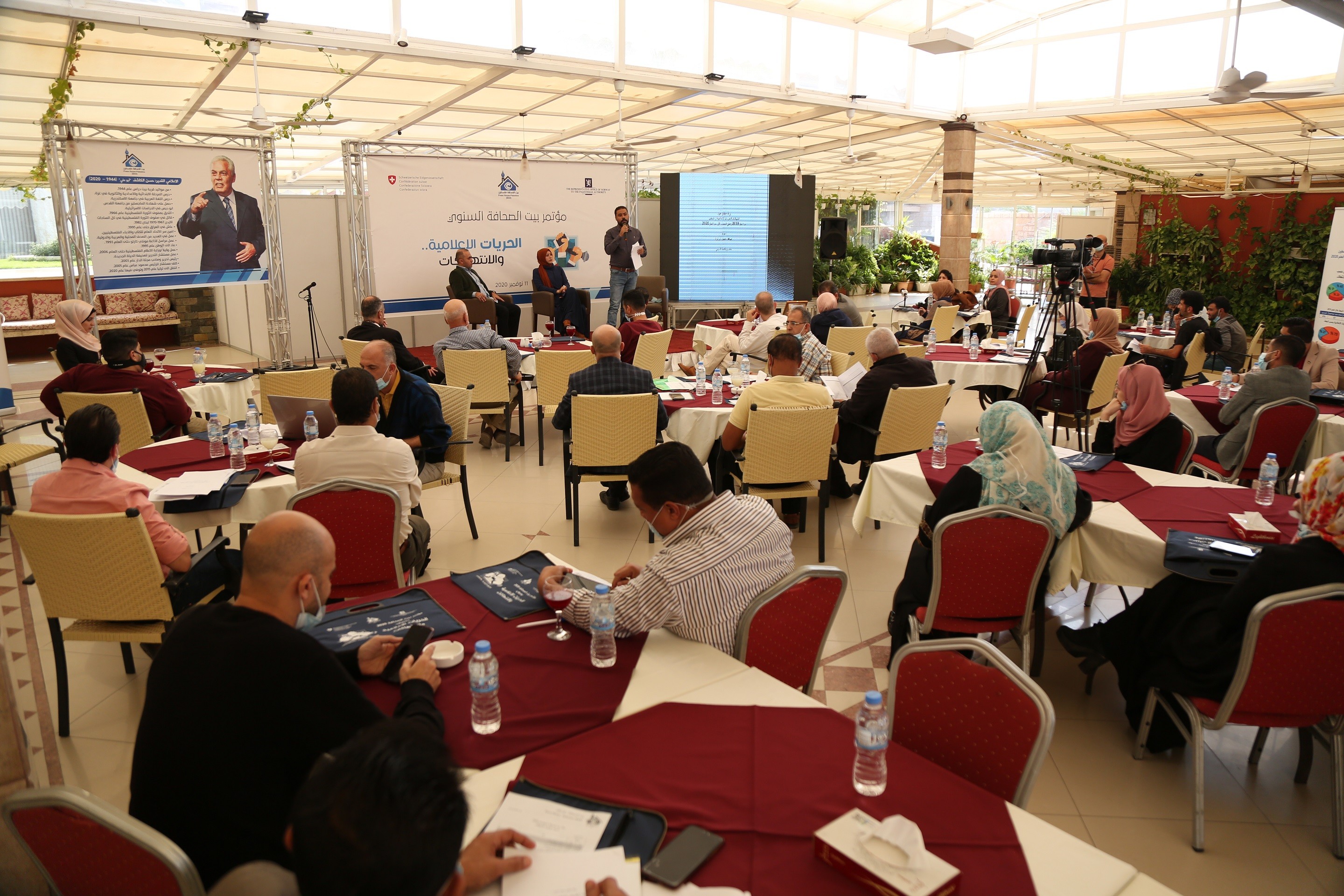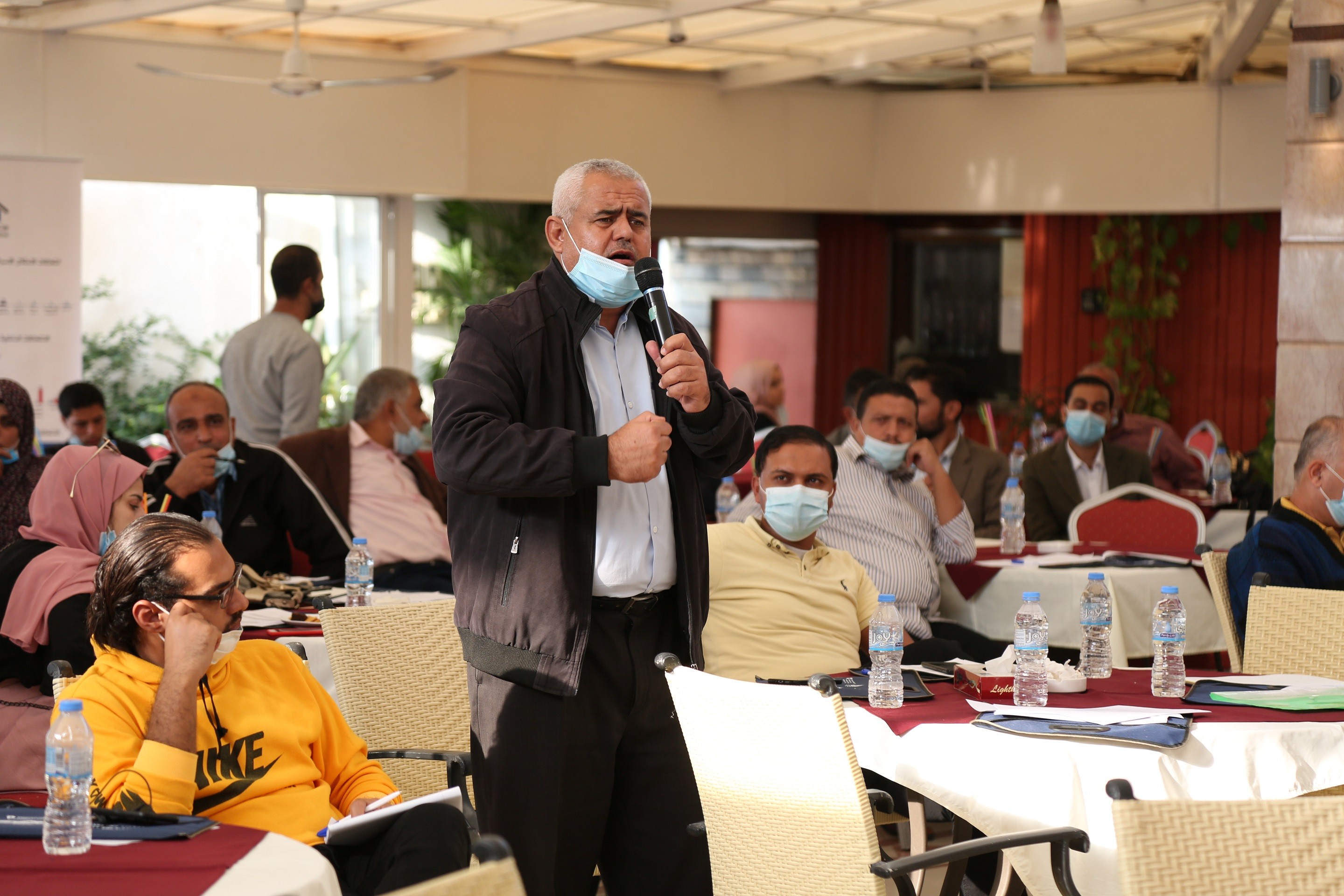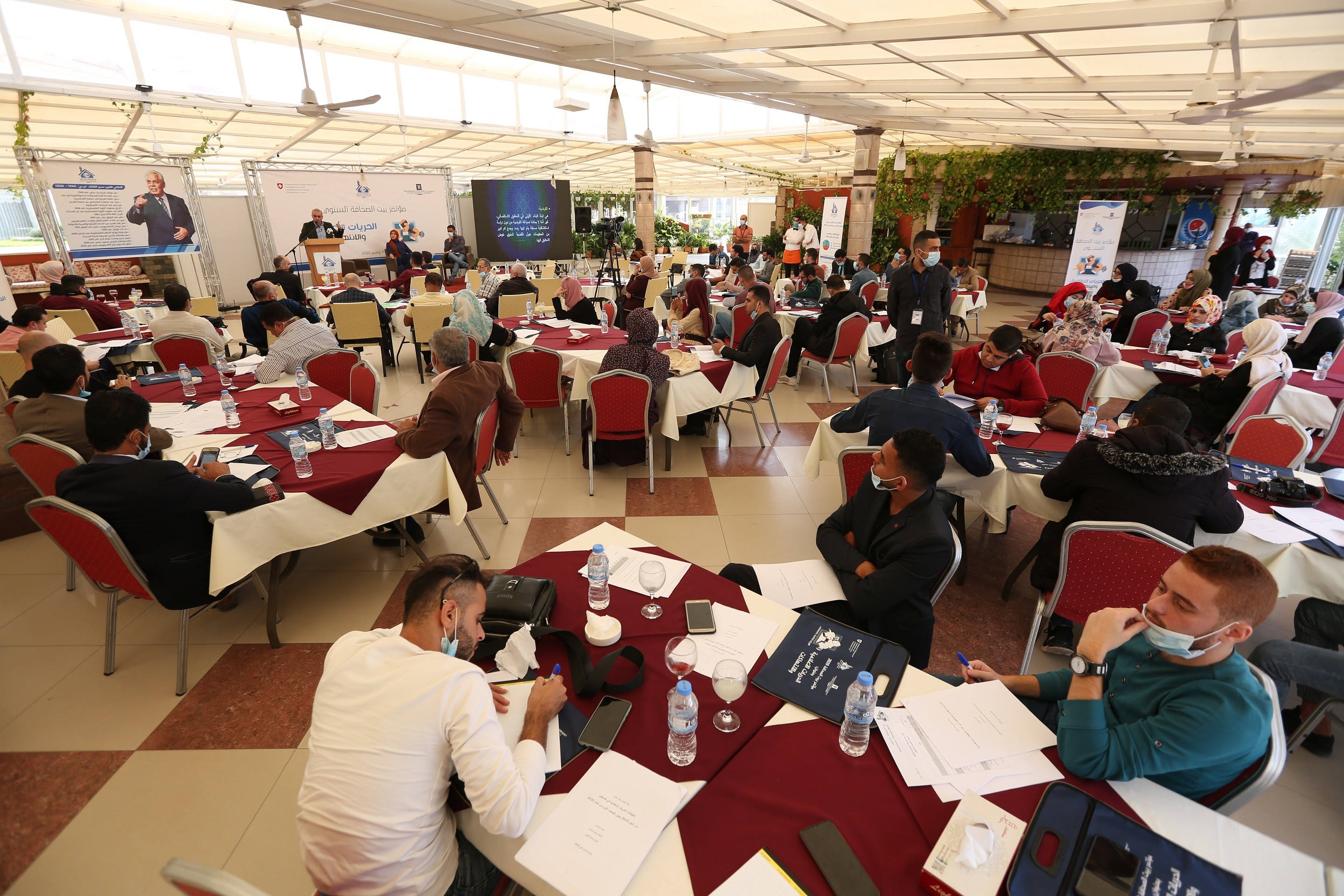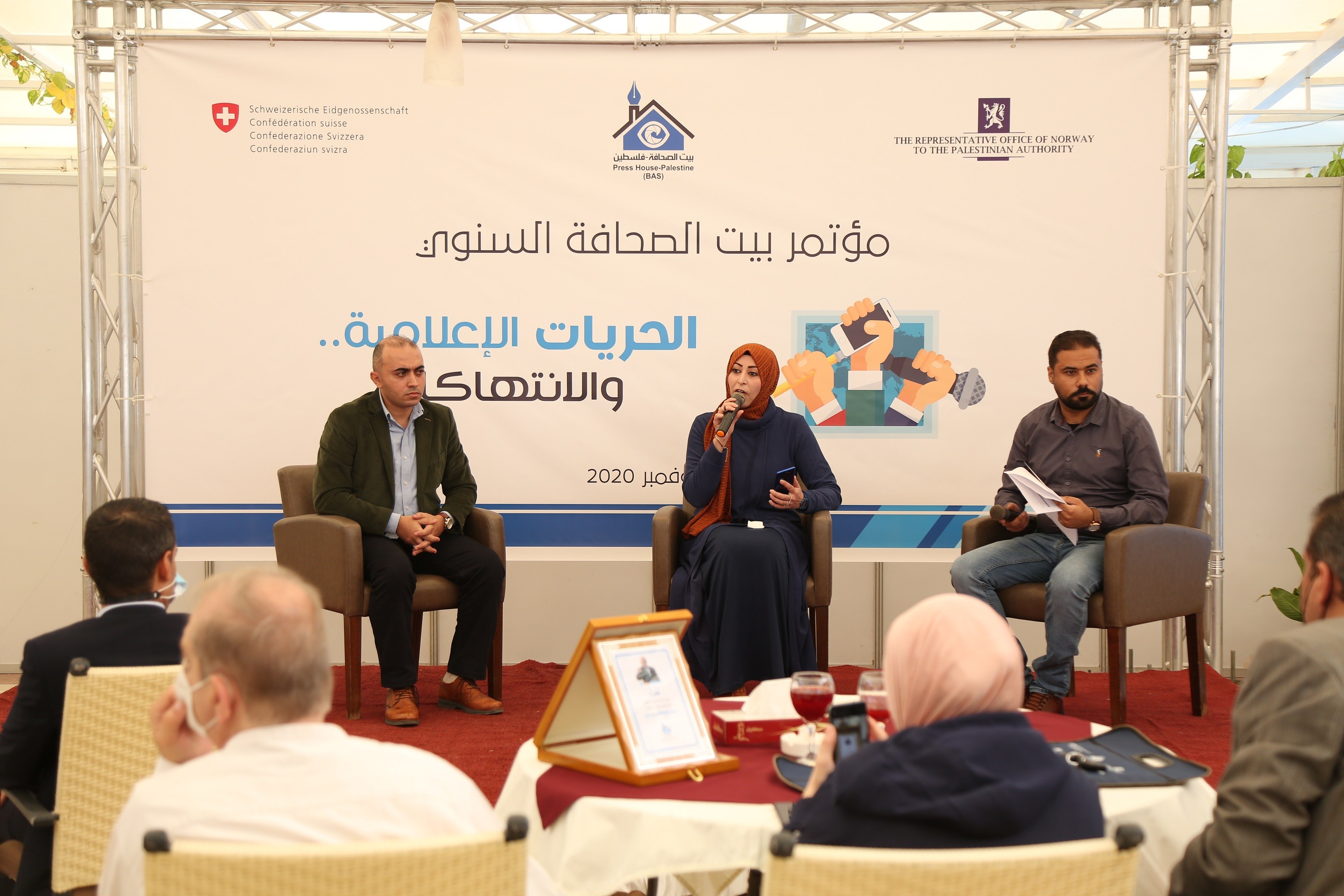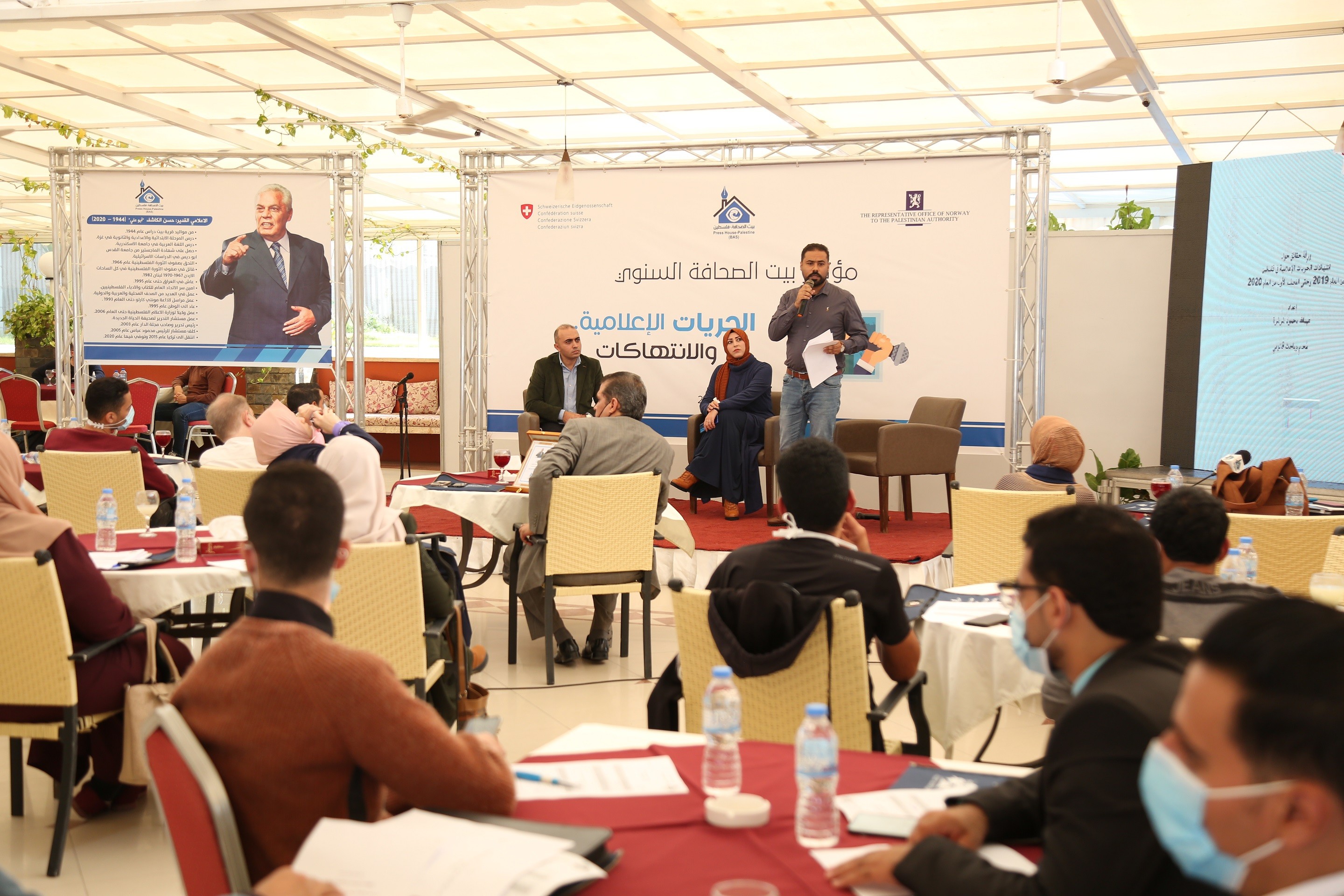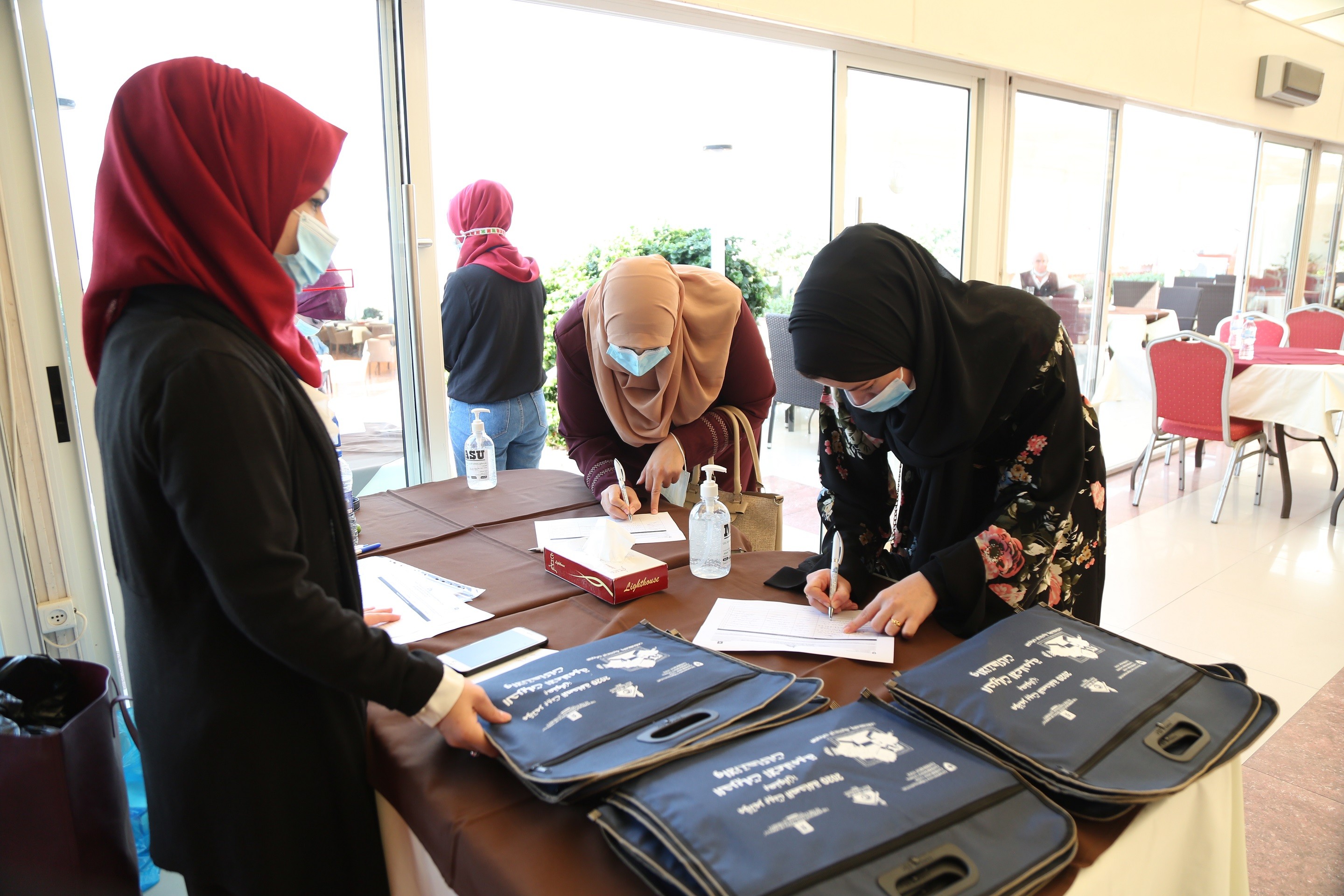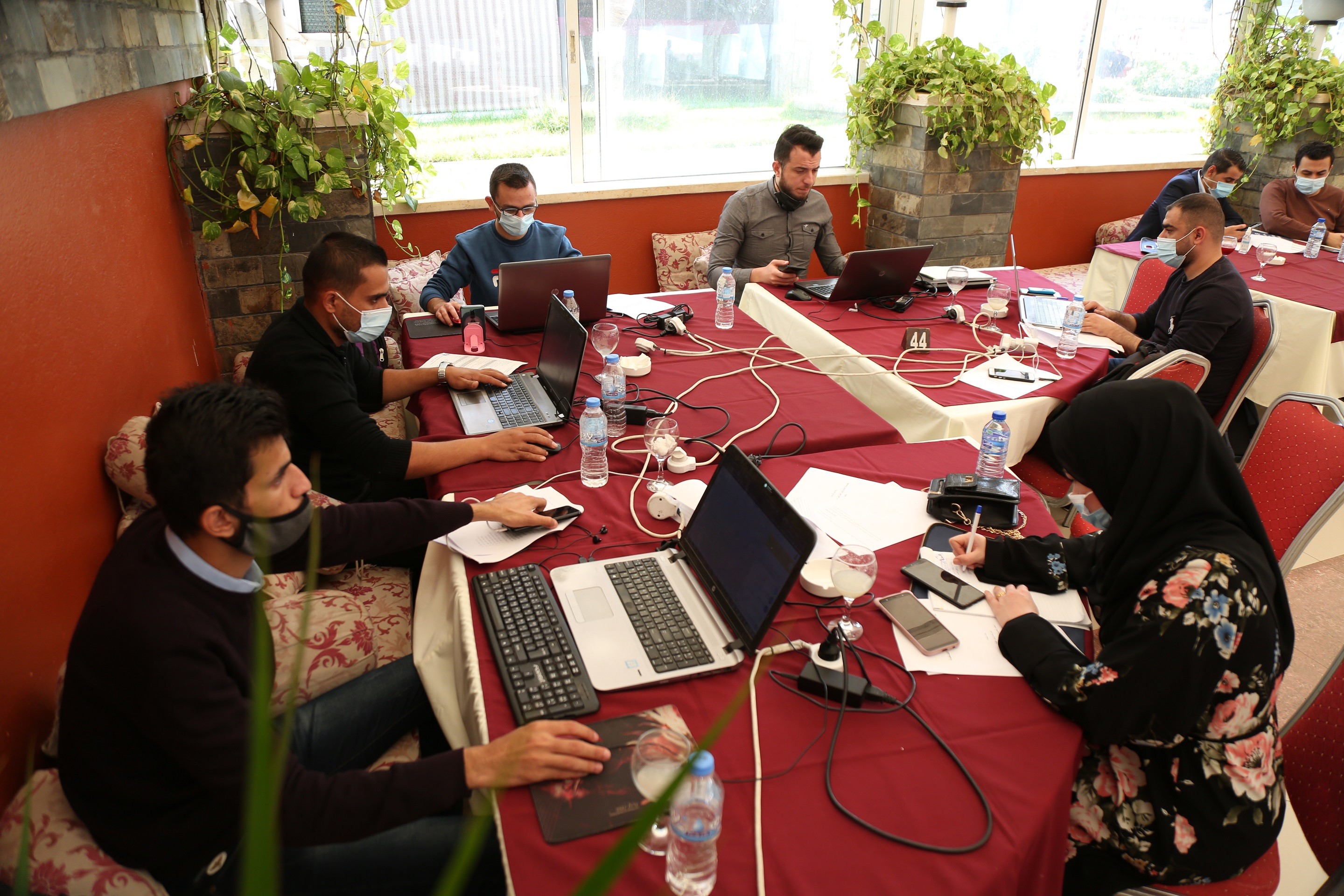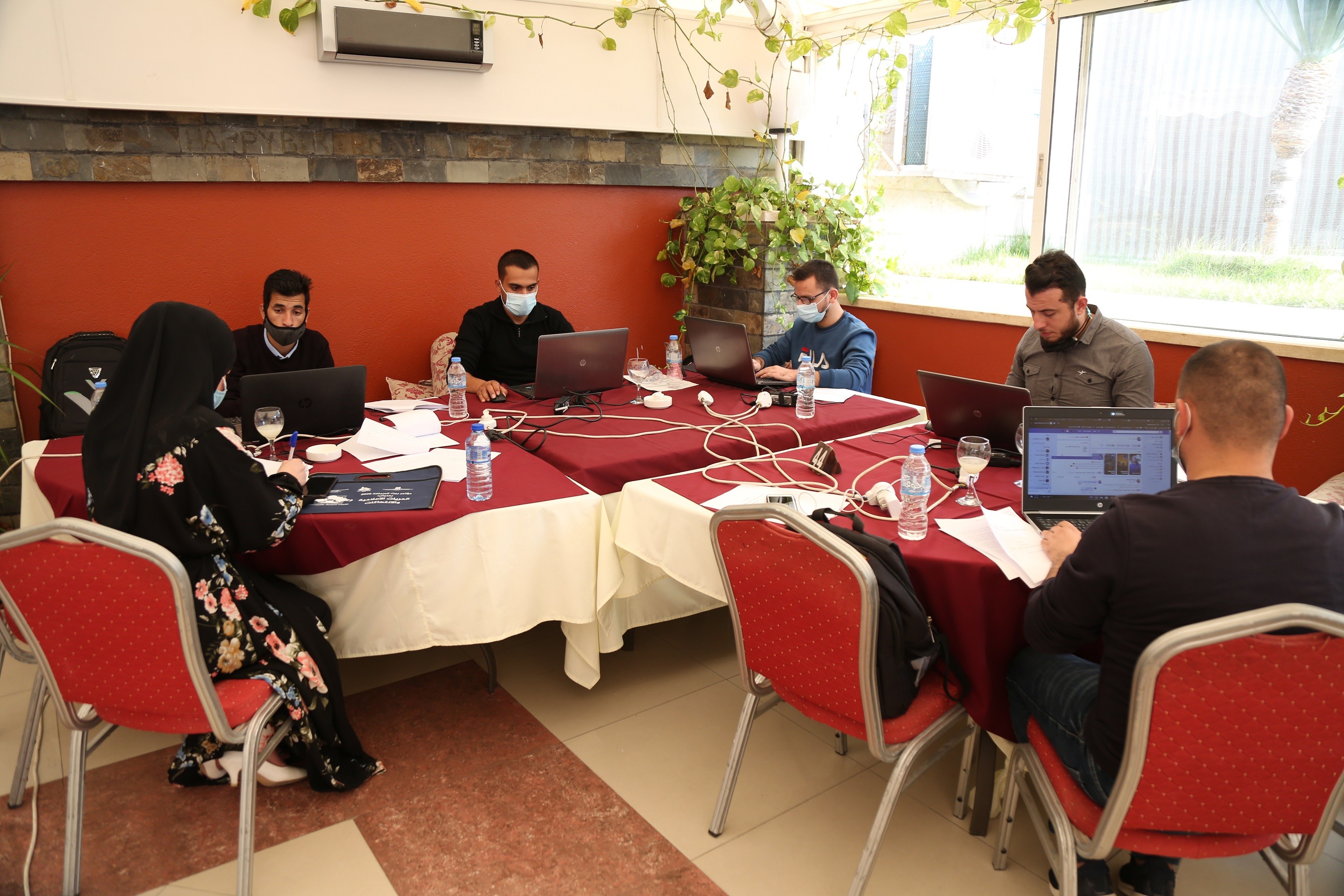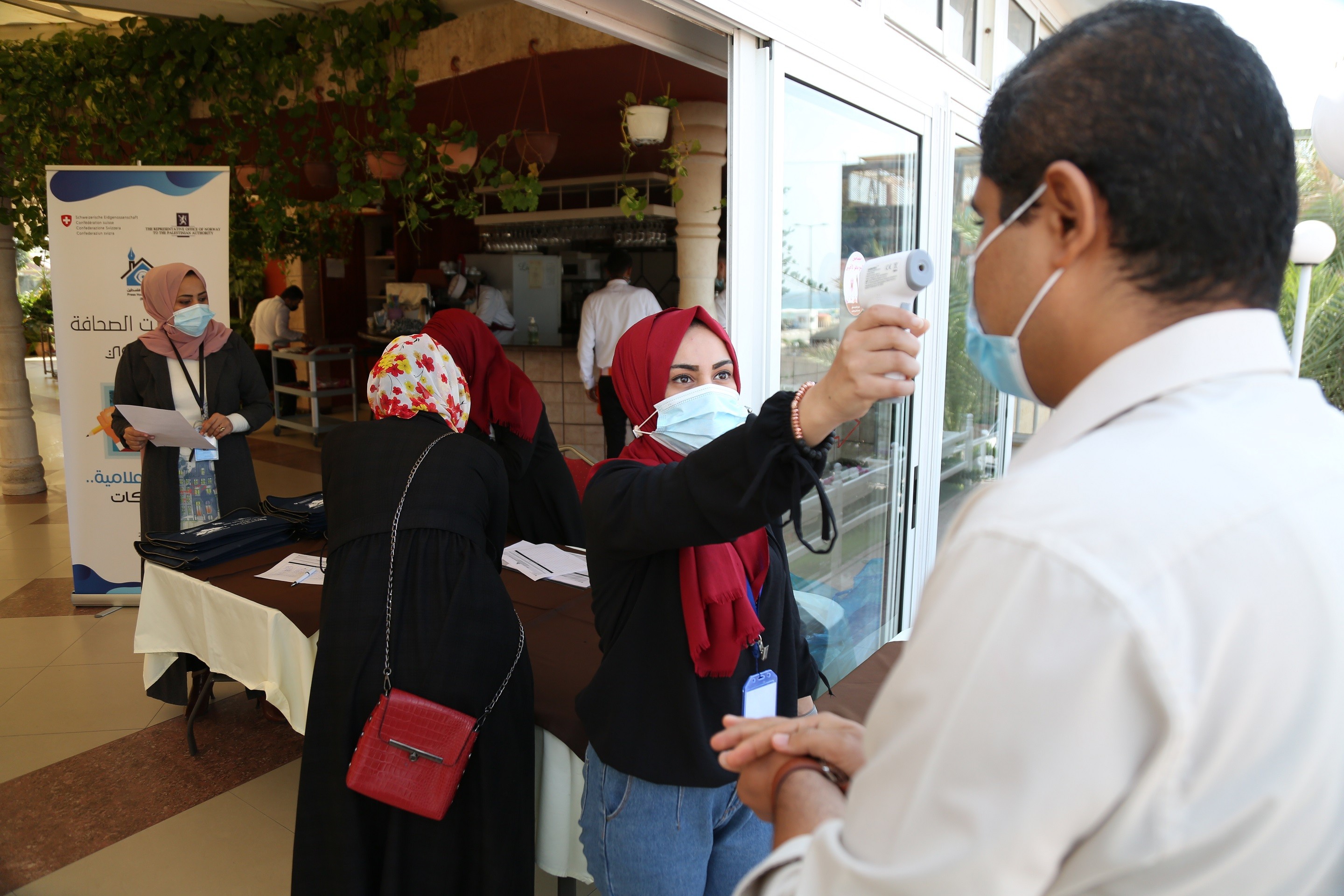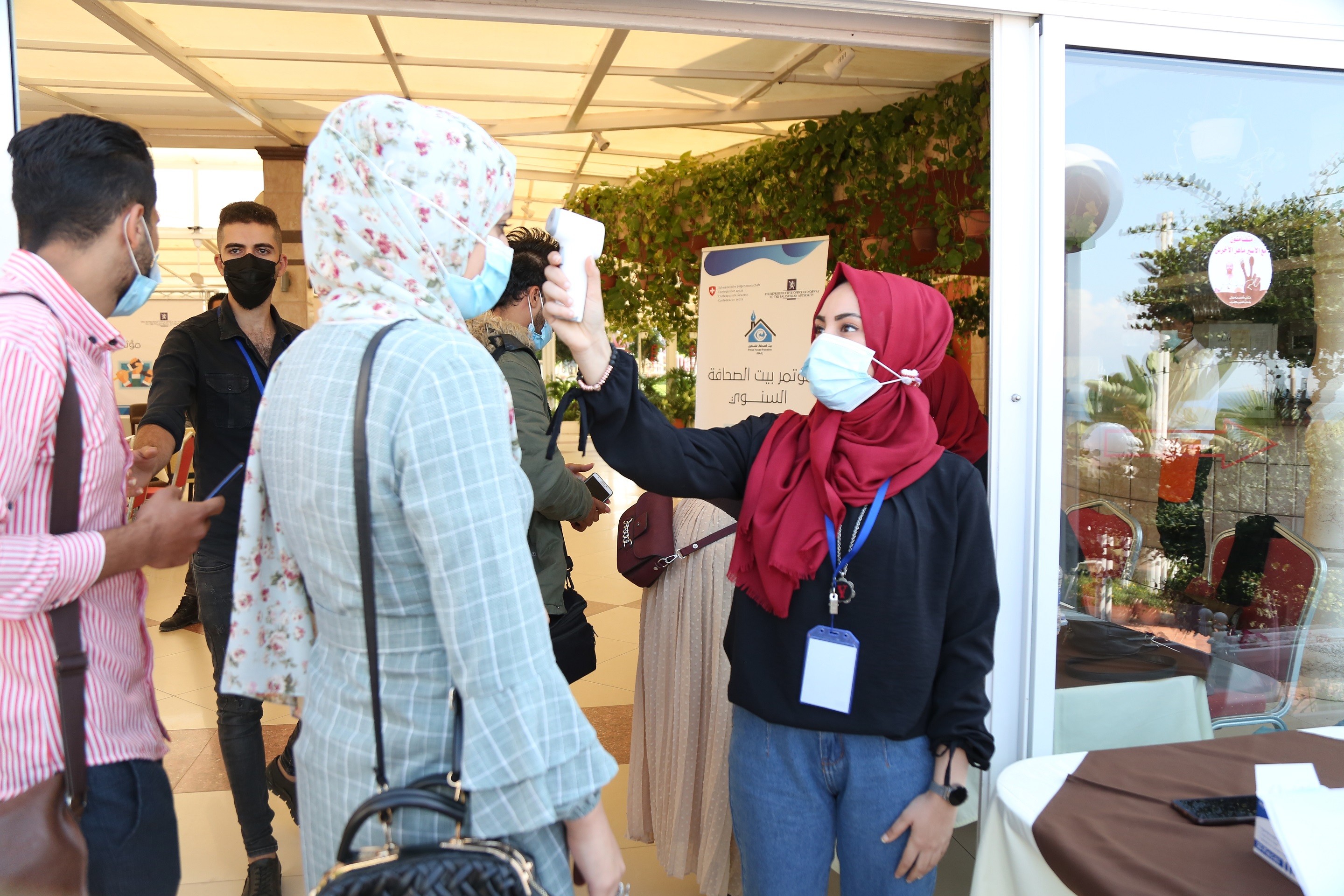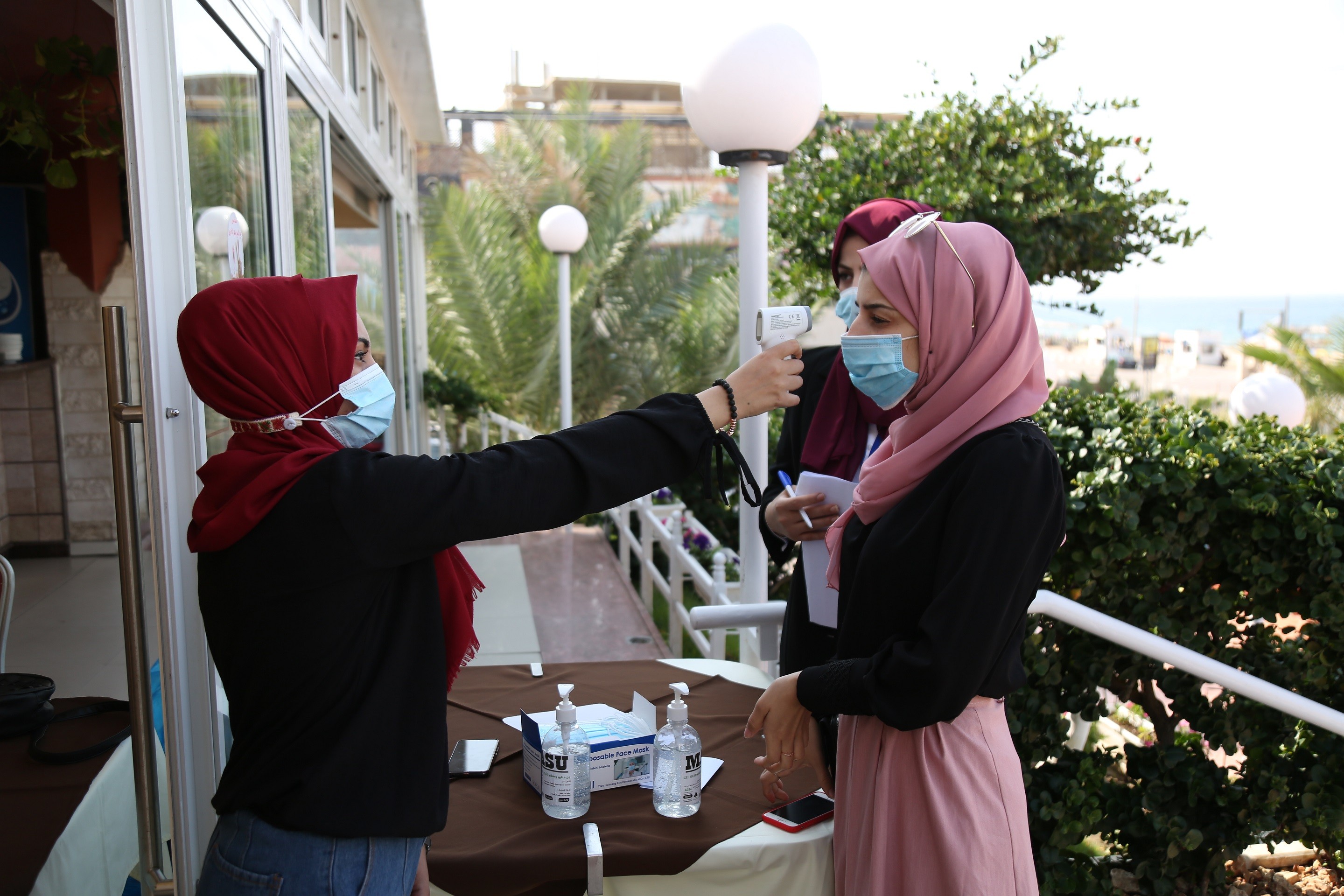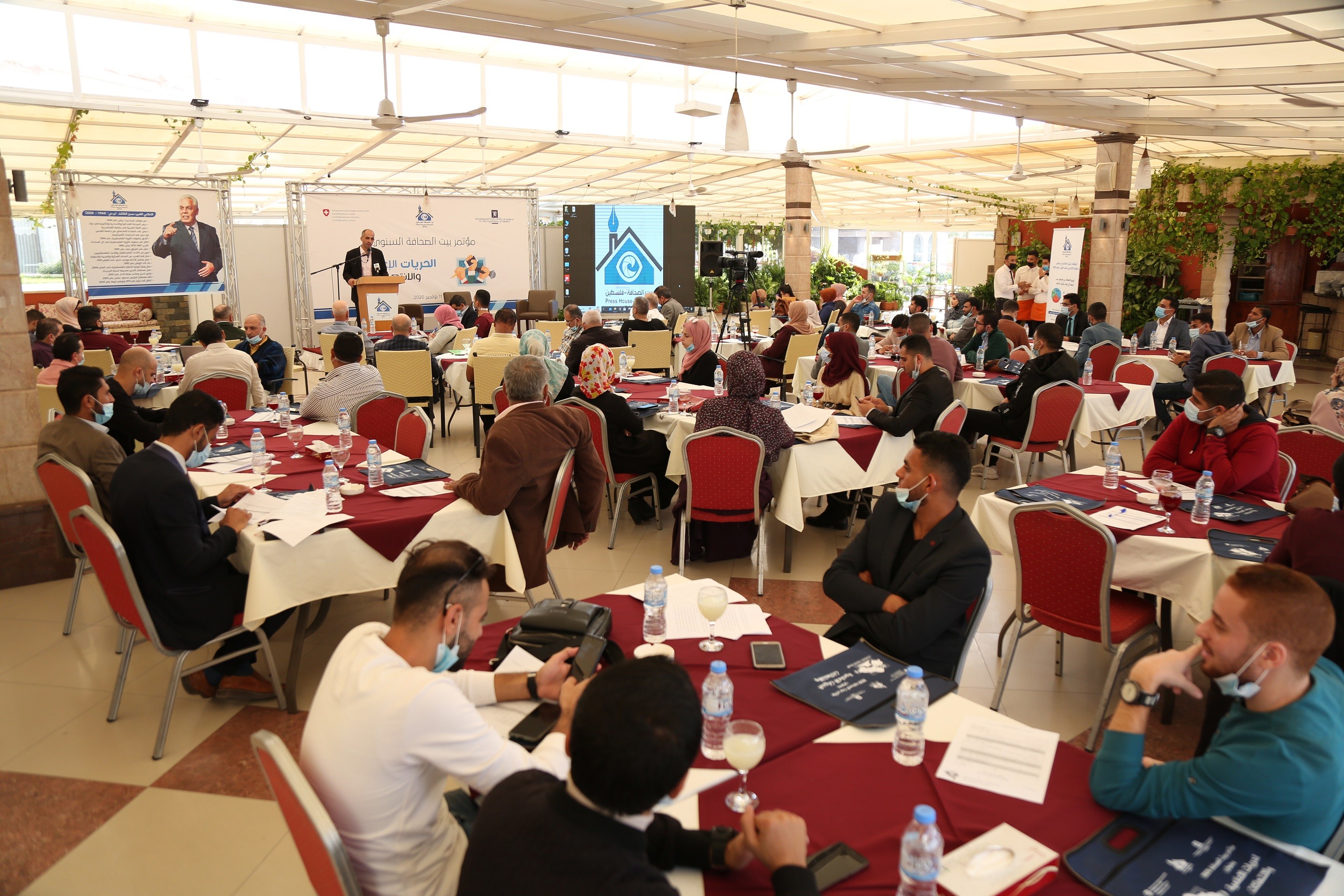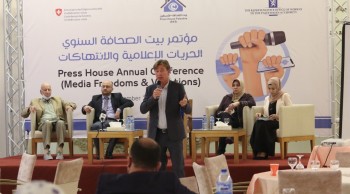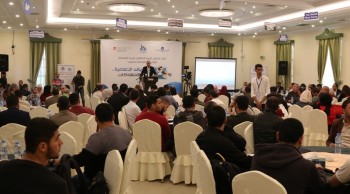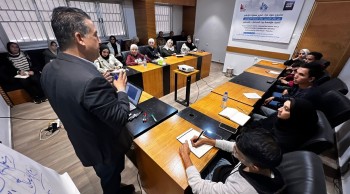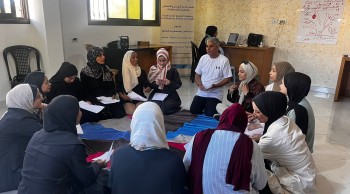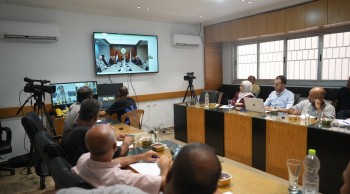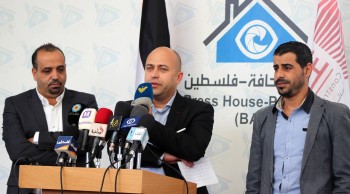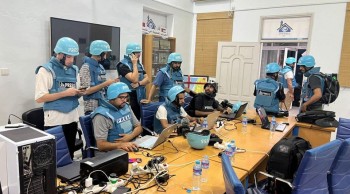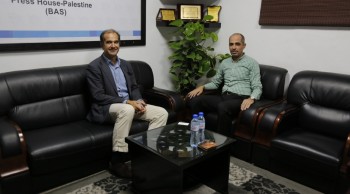Gaza - Press House
With consideration of high preventive measures to prevent the outbreak of Coronavirus, on Wednesday, November 11, 2020, Press House – Palestine (BAS) held its annual conference 2020 on the topic of “Media Freedoms.. and Violations” in Gaza City.
The conference, which was limited to a very limited number, was attended by Mr. Belal Jadallah, director of Press House – Palestine, media, writers, intellectuals, and a number of new journalists and media activists.
At the beginning of his speech, Mr. Jadallah paid tribute to the soul of the martyr President Yasser Arafat, Dr. Saeb Erekat, secretary-general of the Executive Committee of the Palestine Liberation Organization who died yesterday, and our late colleague writer Hassan Al-Kashif, who died a few days ago in Turkey.
In his speech, Mr. Jadallah welcomed the attendance, noting that the conference comes seven years after the establishment of Press House -Palestine, which was established to promote freedom of opinion and expression in Palestine, under preventive measures to prevent the spread of COVID-19.
"Despite the corona pandemic and the measures that followed, the year 2020 saw more than 252 violations of media freedoms, slightly less than in 2019, when 274 violations were recorded during the same period," Mr. Jadallah said.
"The reality of media freedom remains bitter and complex under complex circumstances that our people are living under and ongoing violations targeting media pioneers, in addition to the new reality imposed by the great impact of the emergence and outbreak of the Corona epidemic on our reality in general, and on the Palestinian media scene in particular because of its direct and indirect causes that have negatively affected many media professionals," Mr. Jadallah added.
Mr. Jadallah called for "the need to strengthen the media unit, unify the press body, aside from disagreement, and strengthen joint media efforts to defend media freedom so that we can strongly confront violations of media freedom."
Mr. Jadallah also stressed the need to focus in the media "on documenting the violations of the occupation against the Palestinian press and publishing them in particular in the international media to expose the occupation and its heinous practices against international media freedoms."
Mr. Jadallah added "We call on the international community to pressure the occupation to stop its violations against the press in Palestine in parallel with the prosecution of the killers of Palestinian journalists."
Before starting the first session of the conference, Press House - Palestine honored the family of the late writer Hassan Al-Kashif, where he received the shield of honor for his son, the journalist Zaher Al-Kashef, thanking Press House for this honor, stressing that his father was one of the most defenders of Palestinian journalists, and rejecting any violation they are subjected to.
First session
Mr. Abdullah sharshra, Human rights activist and lawyer, addressed the violation of media freedom in Palestine during a factsheet reviewed at the beginning of the first session moderated by writer Ms. Amal Abu Assi and on the topic of : "Violations of media freedoms in Palestine from 2019 to the first half of 2020."
Mr. Sharshra noted that Palestine ranked 137th in the World Media Freedom Rankings in the 2020 edition.
Mr. Sharshra explained that Palestinian journalists are subjected to violations for two reasons: censorship of public affairs, and the second participation in exposing the practices and violations of occupation for human rights in the Palestinian territories.
According to the perpetrators, violations in Palestine were divided into 60% of occupation violations, 23% internal violations in the Gaza Strip, and 17% internal violations in the West Bank.
Mr. Fadi al-Hasani, a member of the Coordinating Committee of the Palestinian Investigative Journalists Network, reviewed another working paper on the topic of "The Best Practice of Journalists in Preparation of Investigations".
Mr. Al-Hasani began his speech with a simple introduction to the investigative press, which is living in an atmosphere of frustration and self-censorship in the Palestinian territories, pointing out that the investigative press is not free as it is restricted by many legal and illegal controls, and as a result of these and other factors, they are not effective in raising important issues that are a form of government accountability, which reduces public confidence in them.
In his paper, which he presented to the audience, he defined investigative journalism and its role in achieving development within societies, and what did not apply to them?
Mr. Al-Hasani added that investigative journalism has two main functions, the first is to monitor the environment and is intended to inform the public about various issues and provide them with information to ensure that citizens are connected to what is happening in their society, secondly analysis, interpretation and presentation of evidence.
Mr. Al-Hasani spoke in the second axis about how the investigative journalist practices his work professionally, and this is by building the hypothesis correctly in order to form a strong investigation, highlighting in its third axis on the legal culture that the investigative journalist must arm himself, pointing out that the journalist should not be a legal expert but must be looking at some legal matters.
“First, self-censorship, secondly, the lack of information and self-effort to reach it, and thirdly, the demand for the survey without taking the necessary training, and the fourth is the political division” Mr. Al-Hasani concluded the session.
Second session
At the second session of the conference, which was moderated by journalist Ms. Roba al-Ajrami, Mr. Sami Akela, a lecturer at the University College of Applied Sciences, reviewed a research paper on the topic of "Towards aligning media programs in Palestinian universities with the labor market".
The paper included identifying the causes of the gap between the outputs of media programs in universities and the requirements of the labor market, and the relationship to the unemployment crisis among graduates in Palestine.
Mr. Akela referred to the most important factors associated with the unemployment of journalists, which he classified as factors related to employers, factors related to journalists themselves, and factors related to universities.
Mr. Akela reviewed the number of media programs in Palestinian universities, there are 49 media programmes in Gaza alone, while there are 11,900 media students in Gaza.
Mr. Akela concluded by submitting a number of recommendations that would change a little from the reality of graduates and link them to the labor market, the most important of which is the application of the standard process for the development of approaches for training in all media programs in Palestinian universities, in addition to the adoption of media programs in partnership with the media and professional and training institutions and the application of the methodology of linking media education in universities and self-employment and finally the implementation of the article on disciplinary procedures related to infractions of Palestinian higher education institutions in the new higher education law No. 6 for 2018, including freezing the program or shut down.
The session included many participations on how to effectively harmonize university specialization with the labor market in light of the lack of job opportunities, especially in the Gaza Strip, and how to take advantage of market requirements to create suitable jobs.
From his part, the fourth working paper was presented by Engineer Mohammed Al-Afi fi on the topic of “ Media Specialties and Online opportunities and Challenges", and a holistic view of the reality of media Specialties and how to link it to online opportunities.
Mr. Al-Afifi reviewed some facts about media specialties and the challenges facing graduates and their future.
Mr. Al-Afifi discussed the opportunities for media professionals, gaps in academic specialties, and how to build the capacity of media professionals in areas that can be worked online.
Mr. Al-Afifi pointed out that the increase in the number of graduates from media departments in the Gaza Strip year after year, with the increasing unemployment rate among their ranks, and noting that many of them are moving towards working in areas of services outside their specialties.
"The various press and media departments topped the top unemployment rate in 2019, due to the low need of the Palestinian labor market compared to the number of graduates, with the unemployment rate in 2019 in Palestine of 49.6%” Mr. Al-Afifi showed.
Mr. Al-Afifi stressed that the successive financial crises facing Palestinian media institutions have made it difficult to create job opportunities for graduates of journalism and media, as many television channels and news sites have been closed, in addition to the loss of many journalists for their work, Palestinian universities are trying hard to graduate highly trained and competent journalists, working in local and international media, especially since we live in a hot area full of events.
Mr. Al-Afifi added "It is also working to meet the need of the print, audio, visual and electronic media of specialists and cadres who are able to promote the Palestinian media to be able to compete with foreign media. All this is done in the context of studying the situation of the Palestinian media, organizing activities, lectures, seminars and workshops to promote it."
The Conference Recommendations
several recommendations came at the ending of the conference as follows:
1- Call on the high parties contracting the Fourth Geneva Convention of 1949 to work to stop violations of media freedoms committed by the Israeli occupation, especially since the occupation is the cause of the biggest such violations, and pressure towards the beginning to punish the Israeli occupation accountable for violating the rules of international humanitarian law.
2- Ask the Ministry of Foreign Affairs and Expatriate Affairs to work to bring the file of attacks on Palestinian journalists to the table of international institutions such as the Human Rights Council.
3- To call on the Palestinian National Authority to adhere to international conventions related to freedom of opinion and expression, and to comply with Palestinian legislation in accordance with the provisions of international conventions.
4- Suspension of detention proceedings in connection with publishing cases or pending investigation of cases of journalistic pleasure in both the West Bank and The Gaza Strip.
5- Promoting reform orientations that aspire to change and modernization, and this depends on the implementation of two basic functions, which are to monitor the environment, inform the public about various issues to activate their participation, analysis, interpretation, and provide evidence to strengthen the fight against corruption and curb it and form a public opinion against it.
6- Investigative journalism is not a leaky press, nor a critical press, not even journalism specialized in covering crimes and corruption, because it relies on a research hypothesis and methodology that leads to the presentation of professional, integrated and proven journalism work.
7- Journalists in general and investigative people in particular are armed with the law and the ceiling of freedom imposed by the regimes and their limitations, ensuring that journalists do not find themselves in confrontation with the accused at the gates of the judiciary.
8- One of the most important components of the investigation, which is only completed as a basic criterion, objectivity and balance of presentation, is to confront persons accused of corruption, failure to enforce the law, or who use public office to serve special interests.
9- Time is a lifeline for journalists to break free from self-censorship, plays an important role in raising sensitive issues and forces society to accept them, so issues that raise public opinion must be exploited.
10- All research tools must be used to access information, studies conducted by independent research centers, human rights centers, or specialized NGOs, which form a basis for journalists to guide and build on them in providing their information, in order to overcome the dilemma of not passing the Right to Information.
11- Journalists should look for independent media to adopt the publication of their investigations in order to avoid any pressure tools that may be exerted by different parties, or fall into the trap of bias.
12- Raising awareness of the opportunities for self-employment, the specialties of journalism and the media.
13- Inclusion of a specialized course on self-employment in the faculties of journalism and media.
14- Developing the curriculum in accordance with the needs of the external market.
15- Developing English language skills for students and graduates of journalism and media specialties.
16- Preparing specialized training programs for graduates in specialized fields and in the fields of self-employment.
17- Directing media companies to carry out work in a proportionate field with self-employed platforms.
18- Mobilize support from supporting organizations to provide funded programs to support the employment of journalists and media professionals across self-employment platforms.
